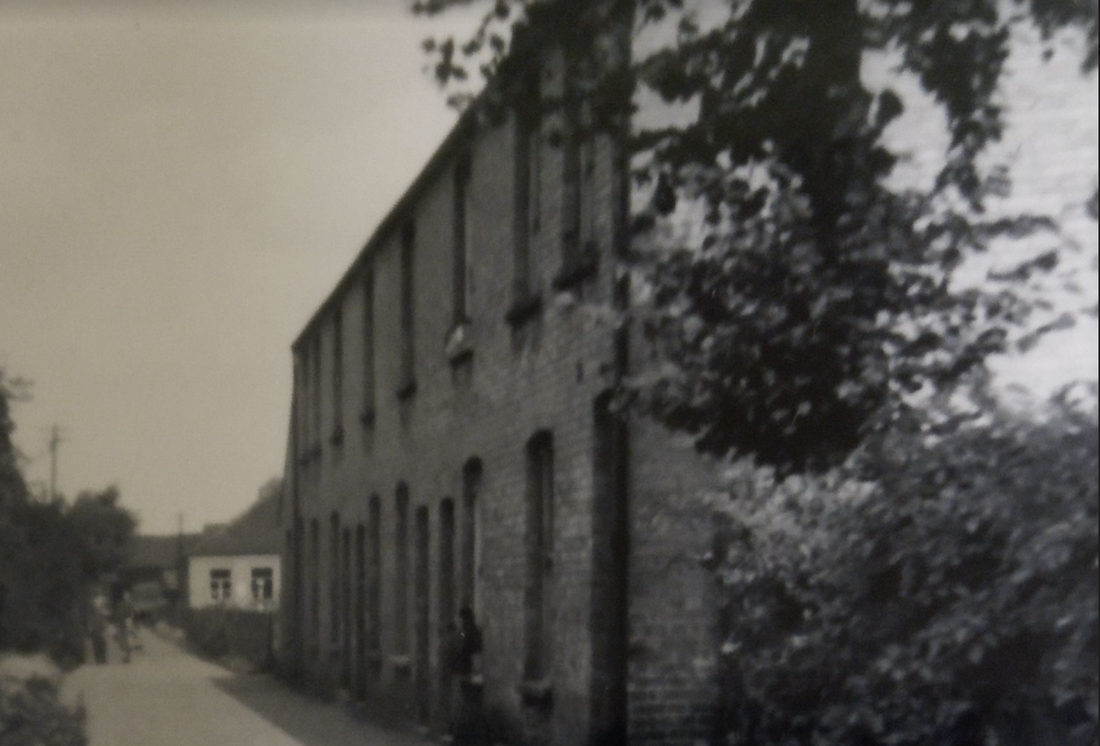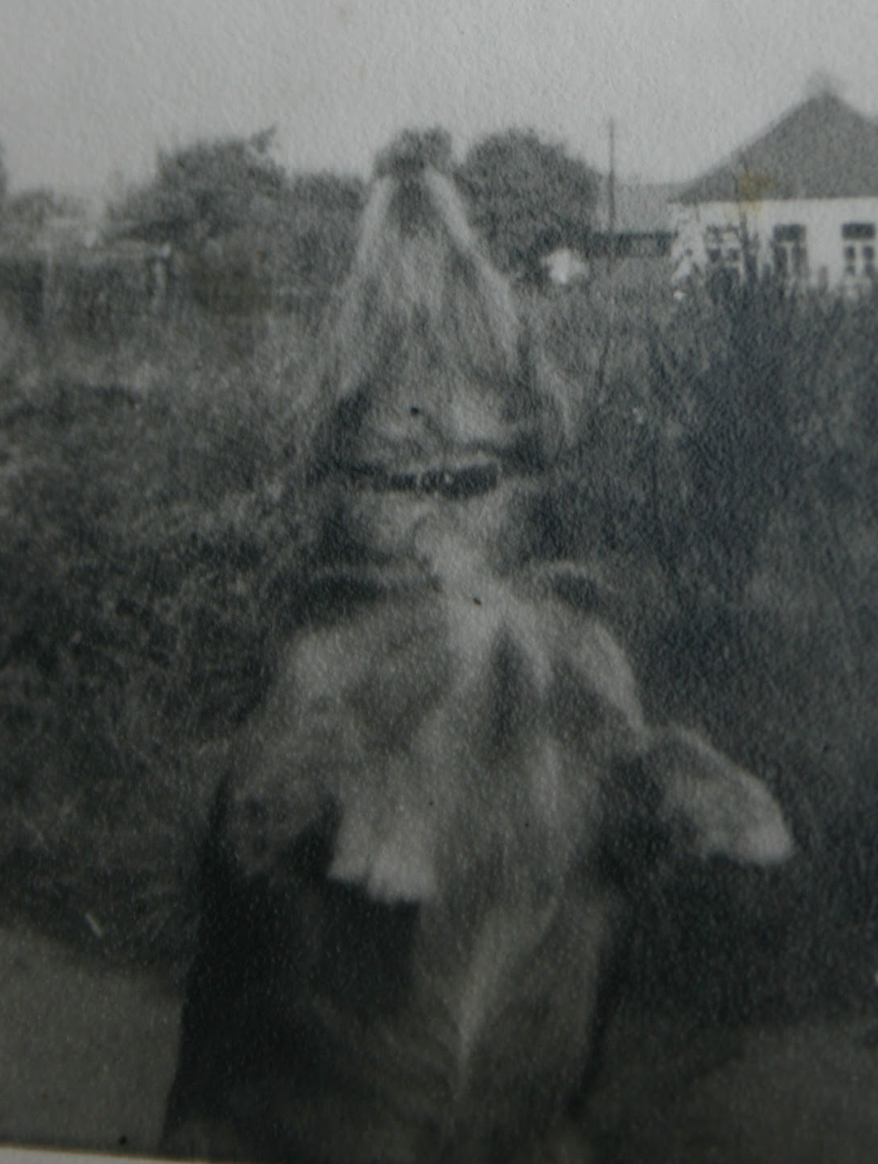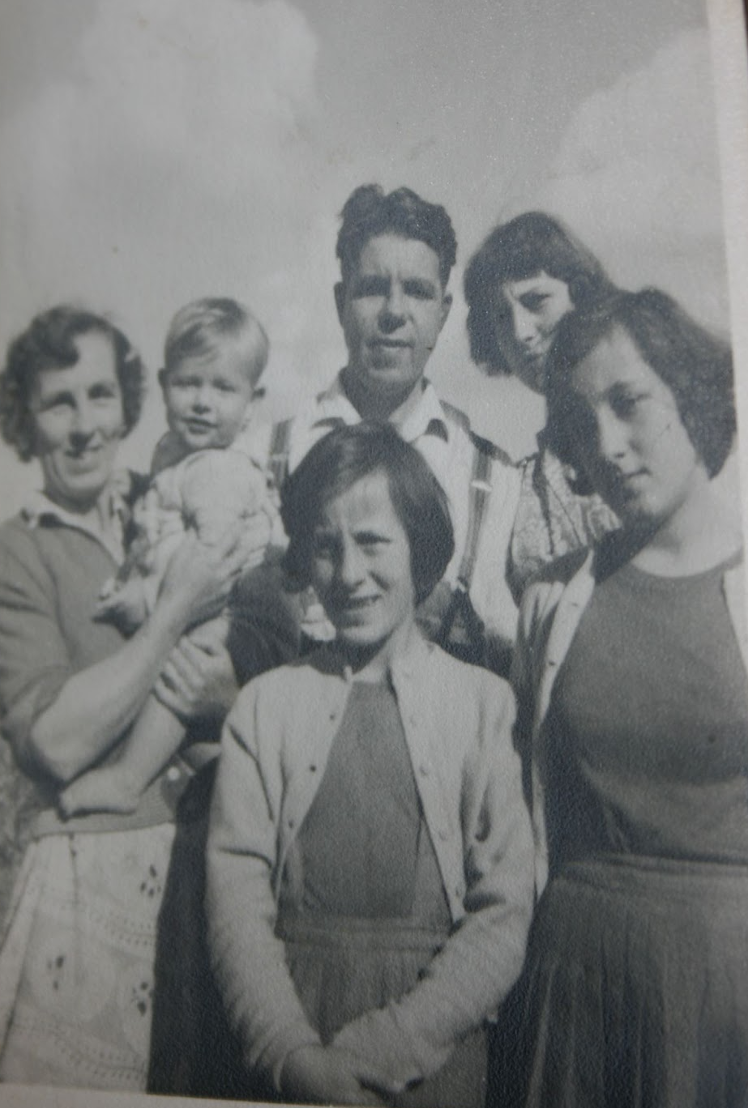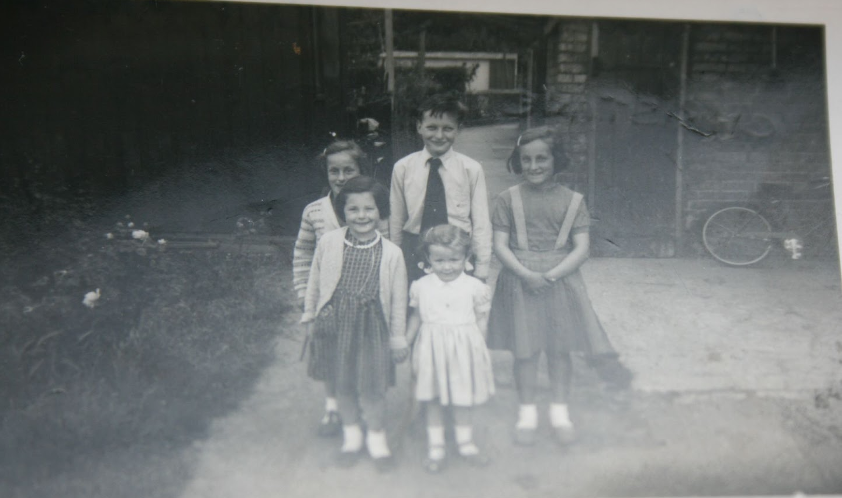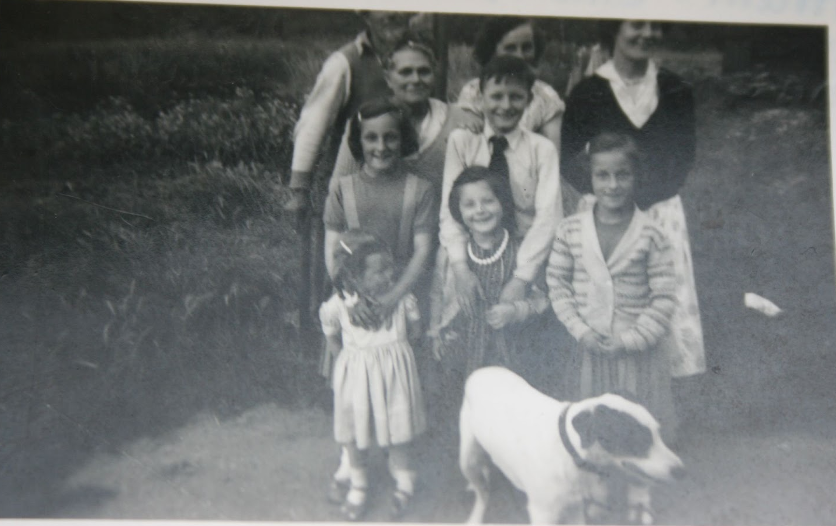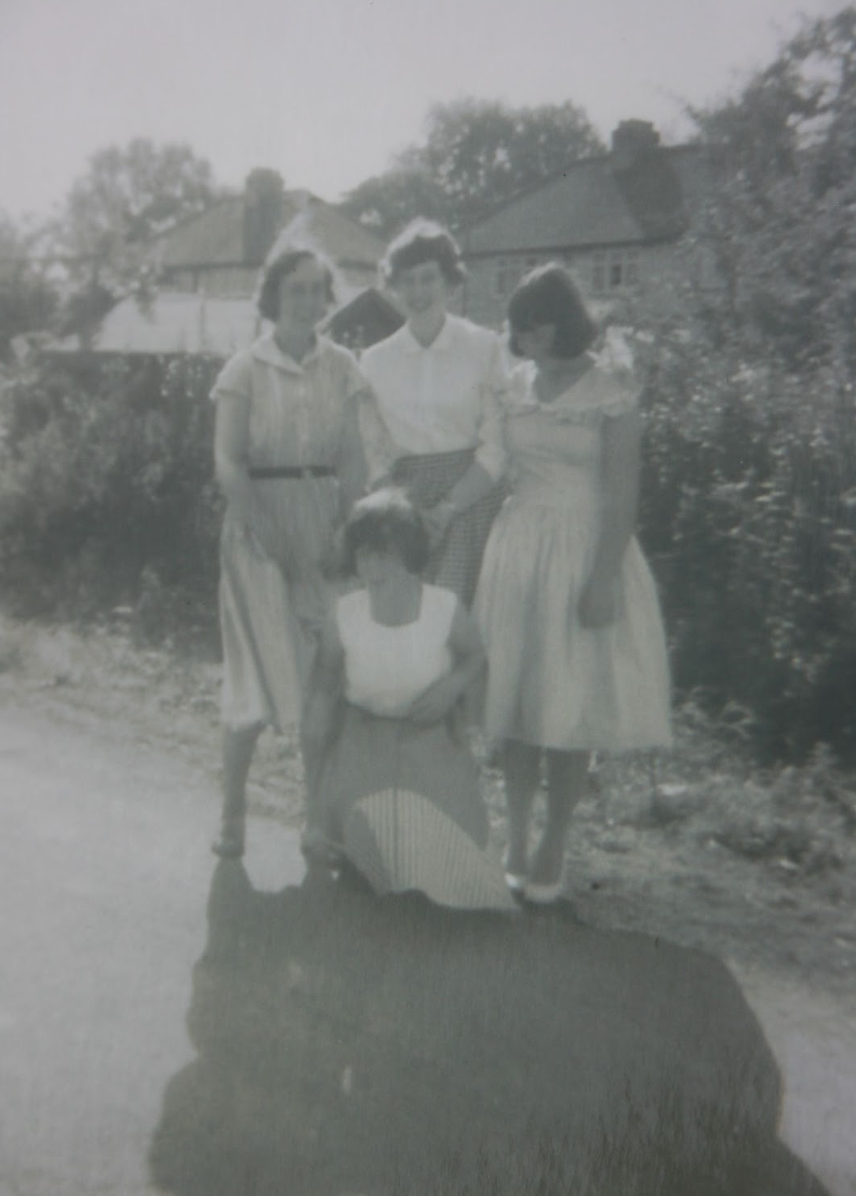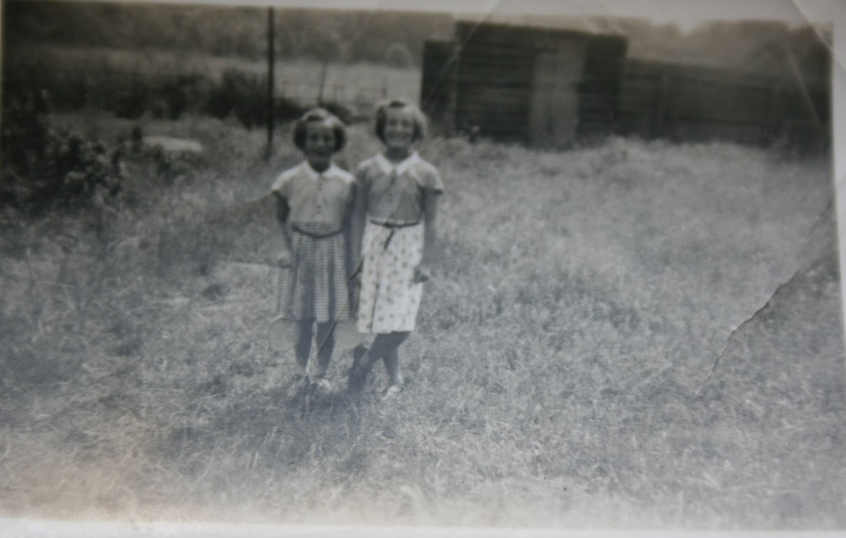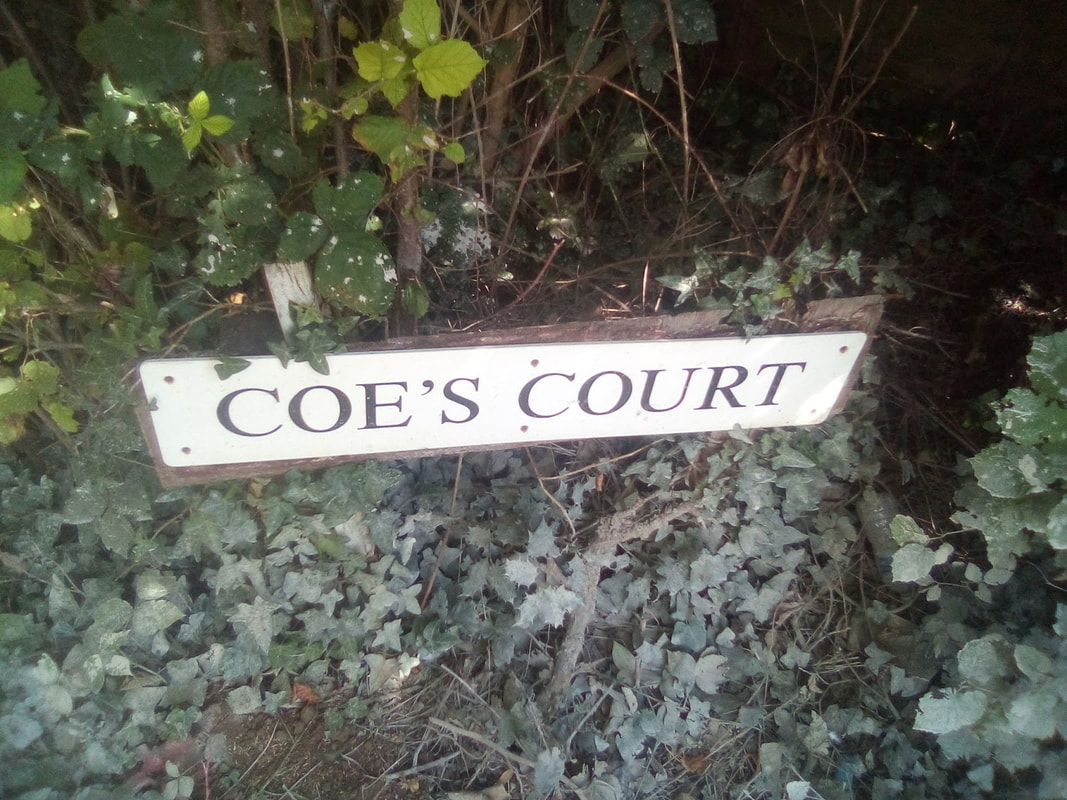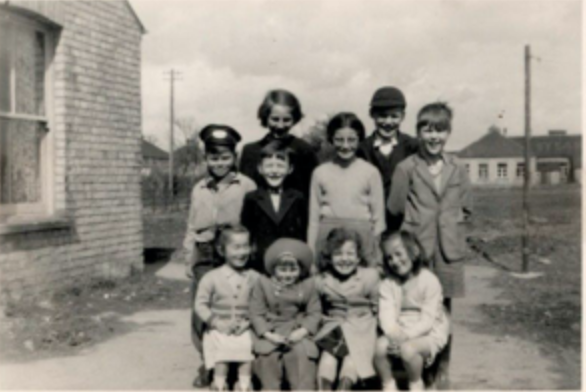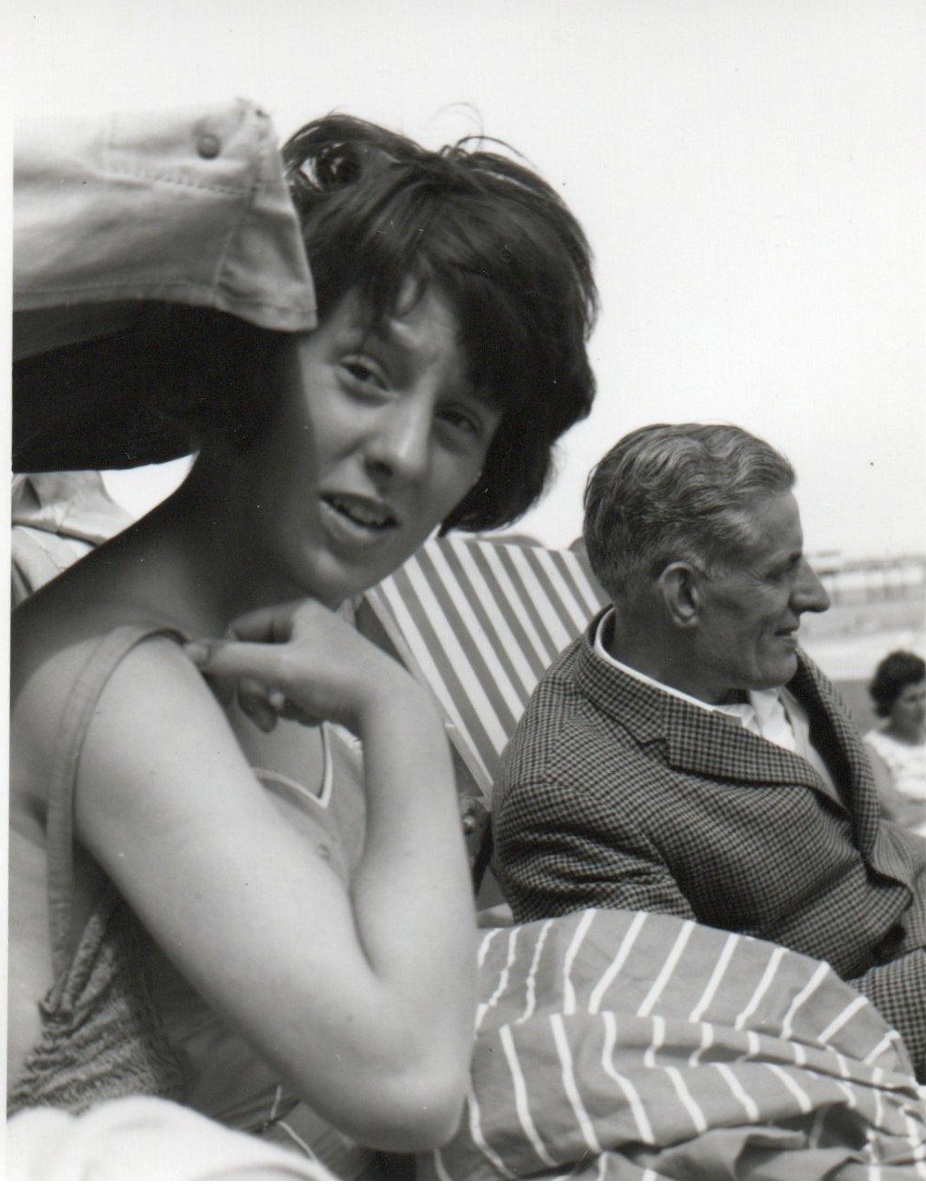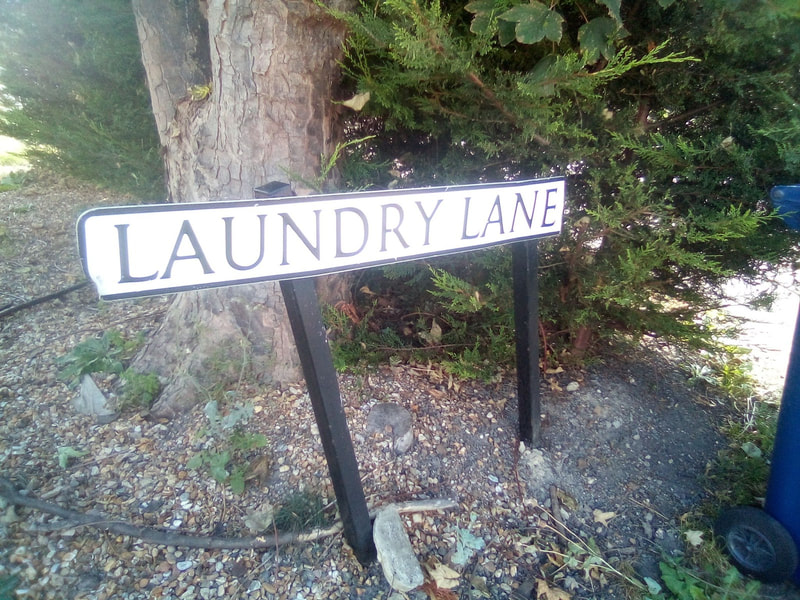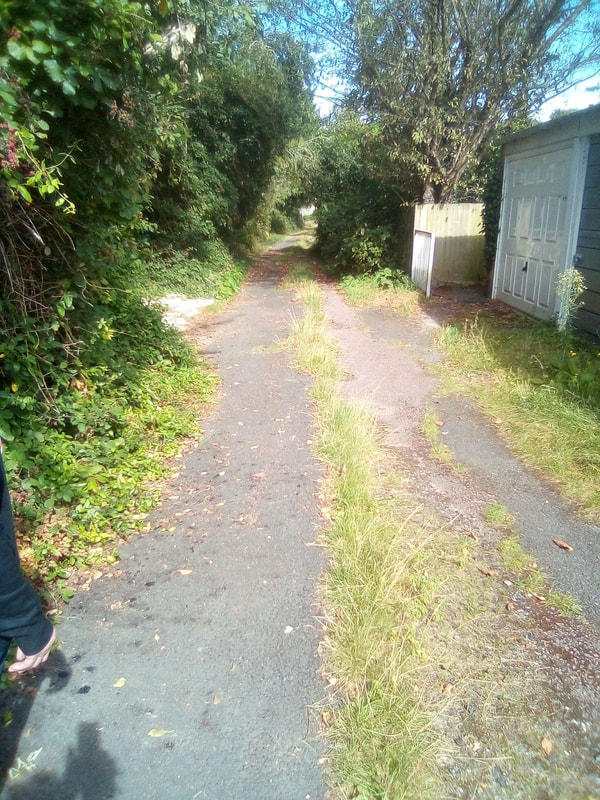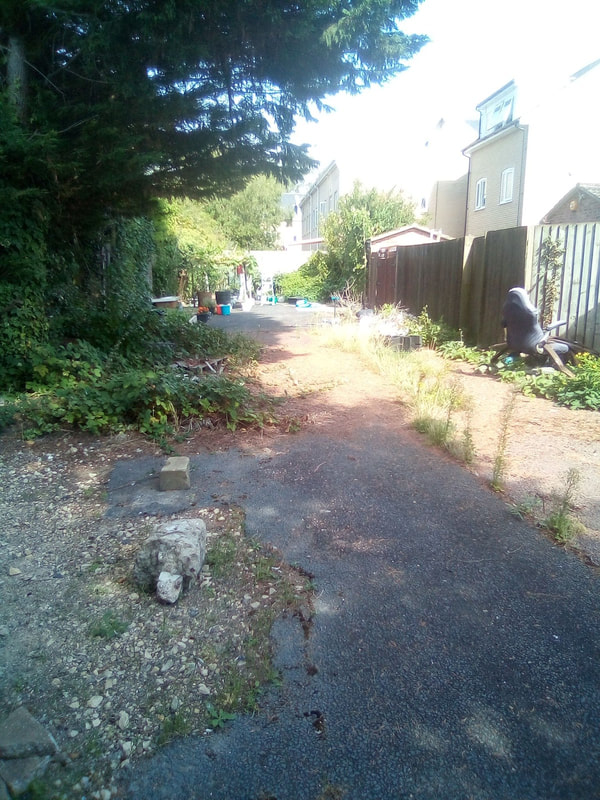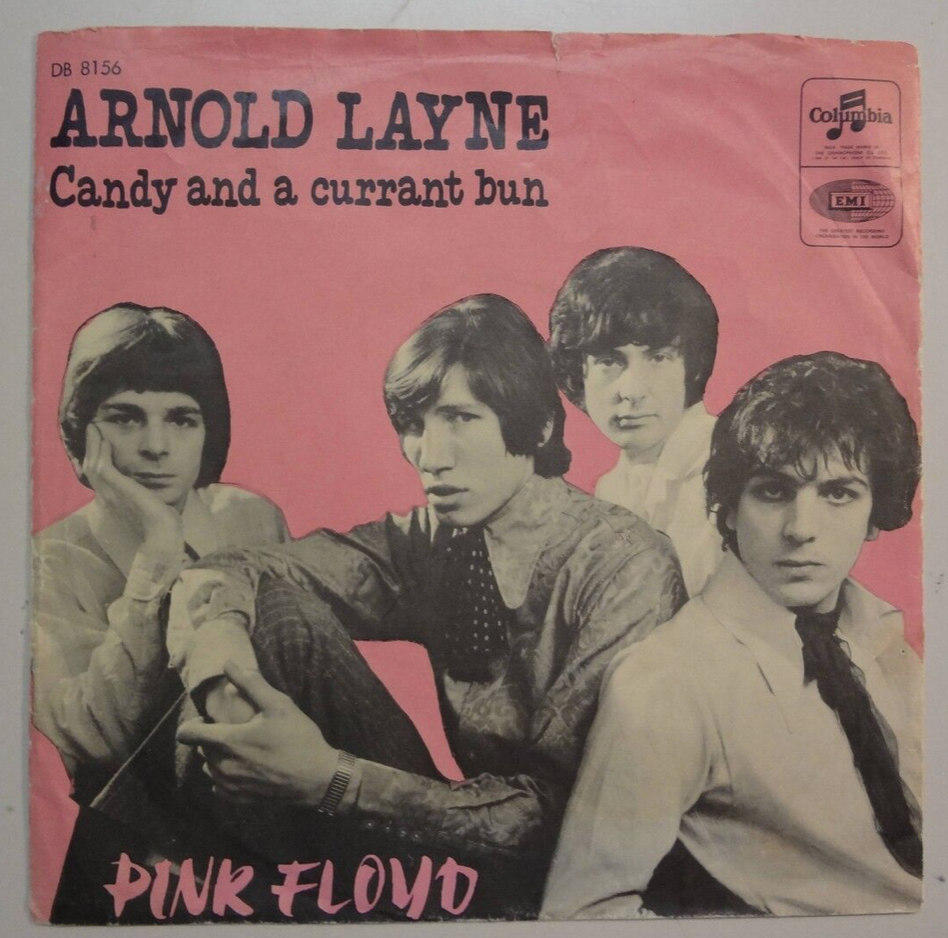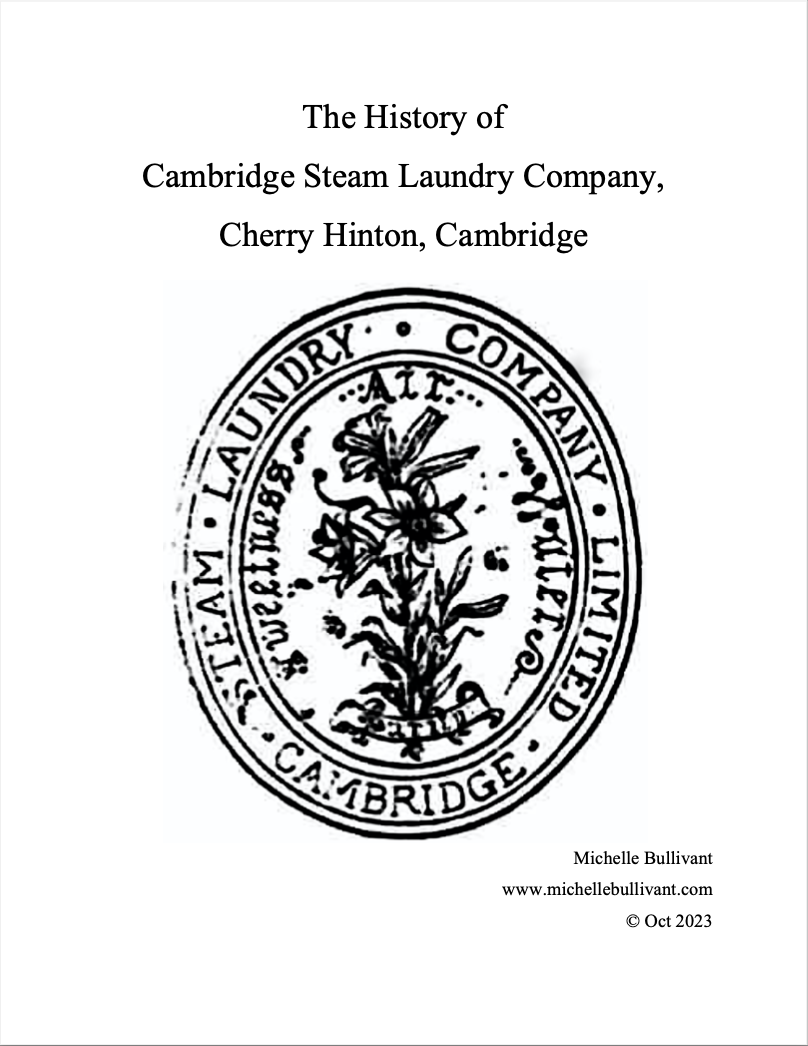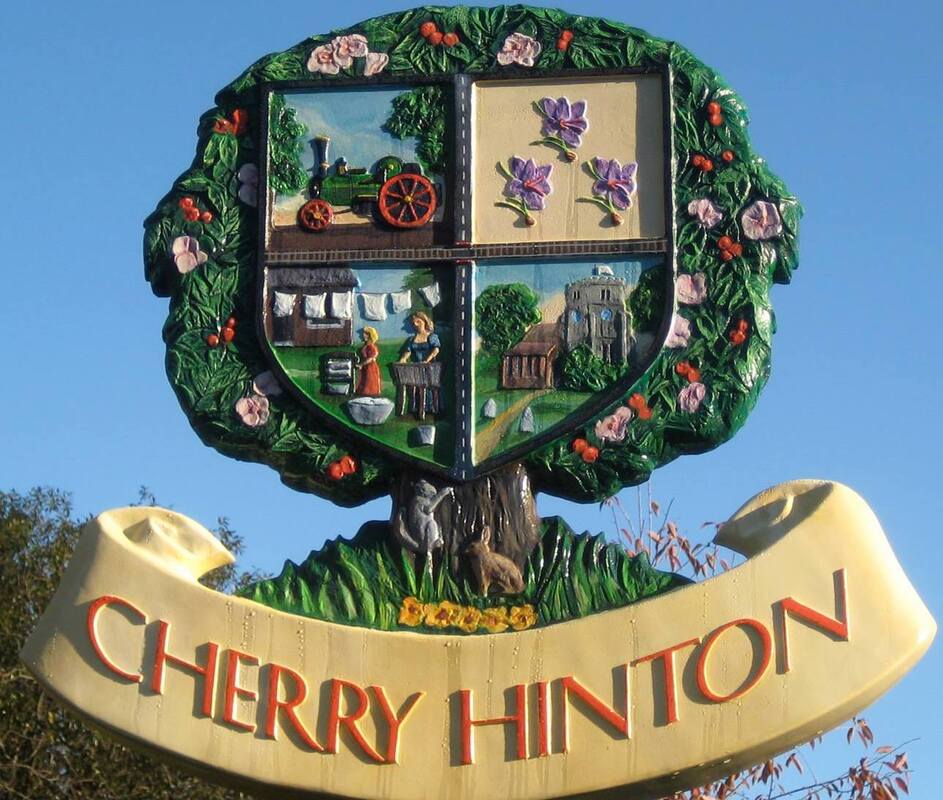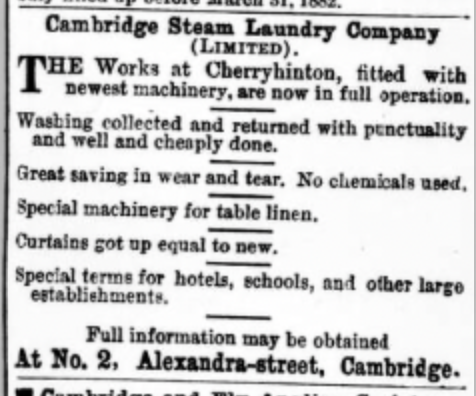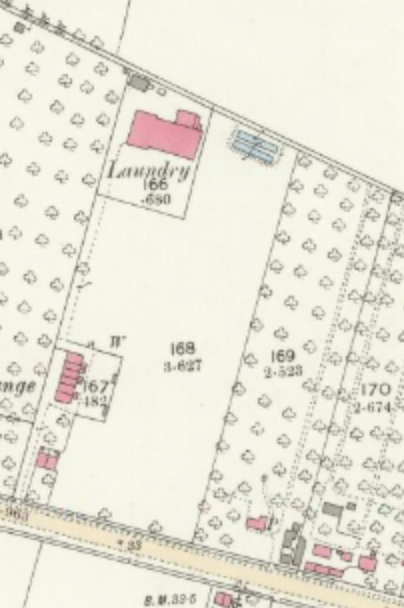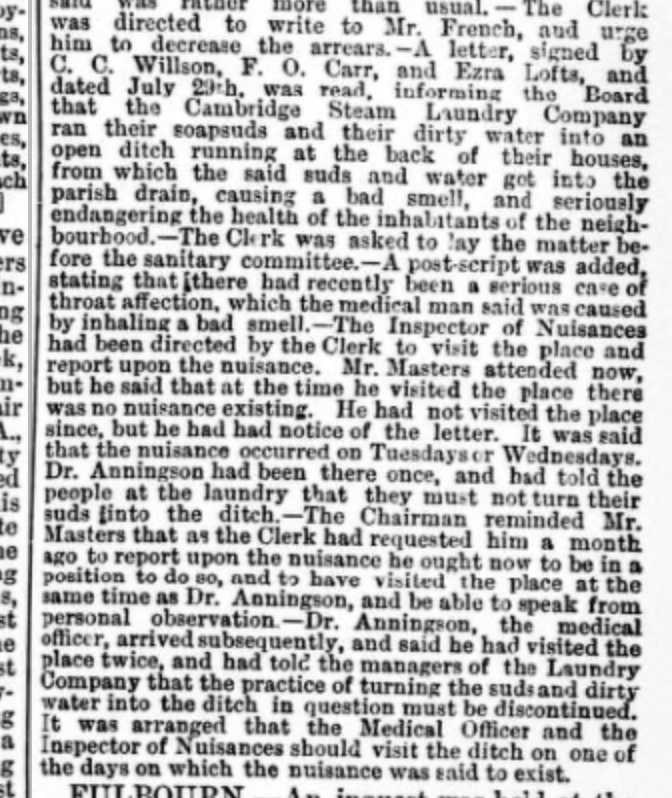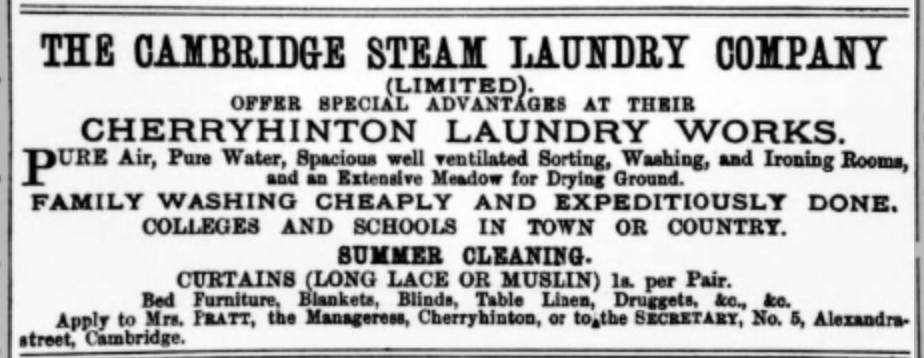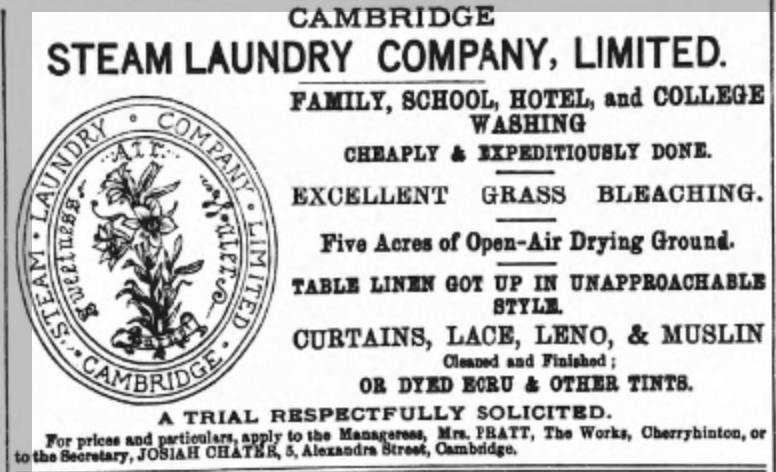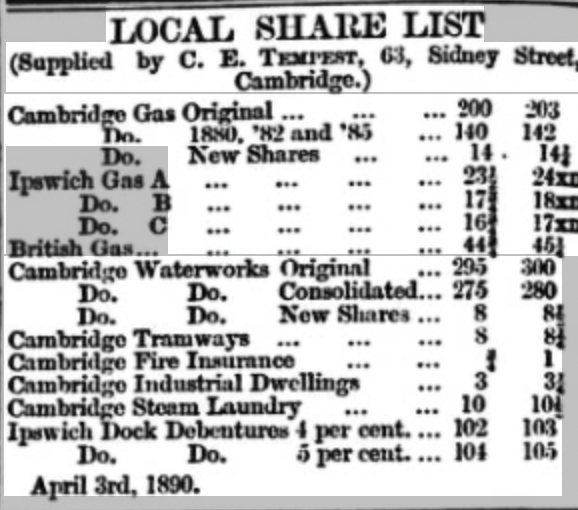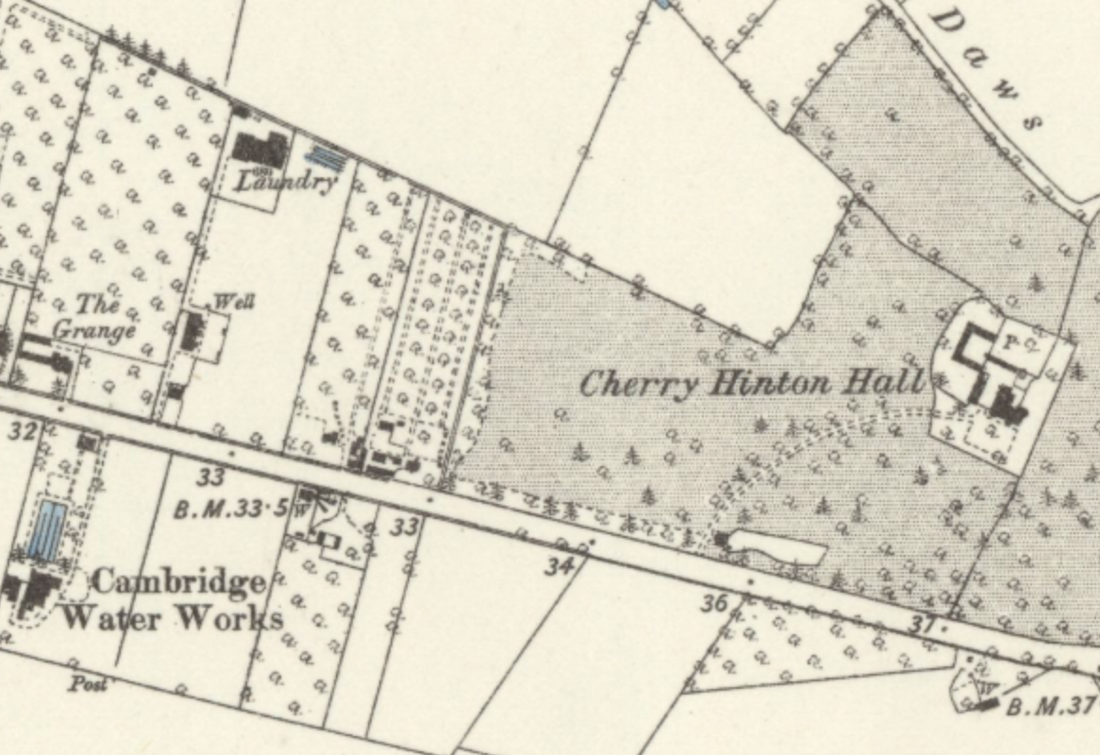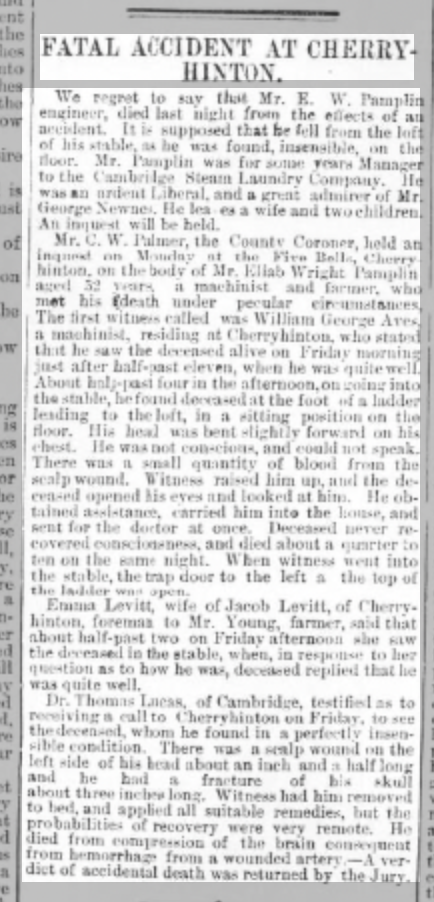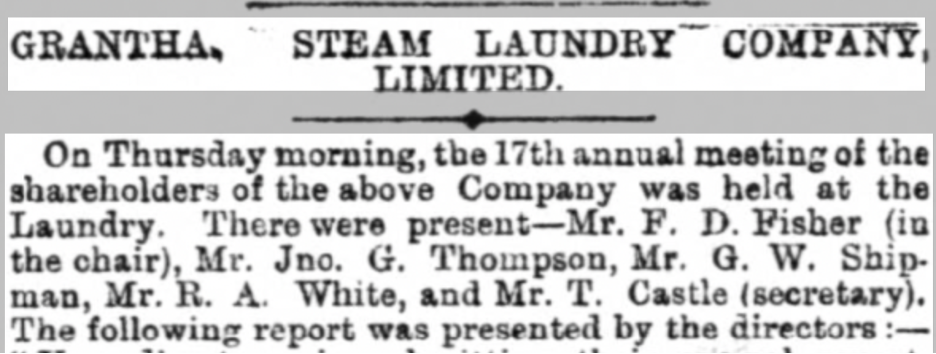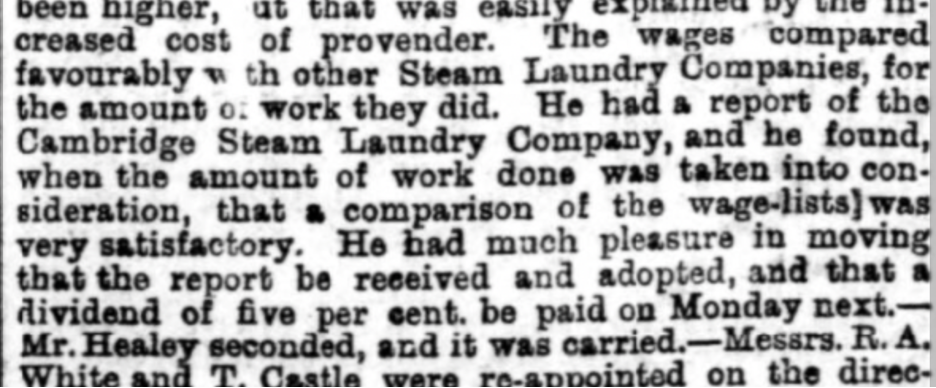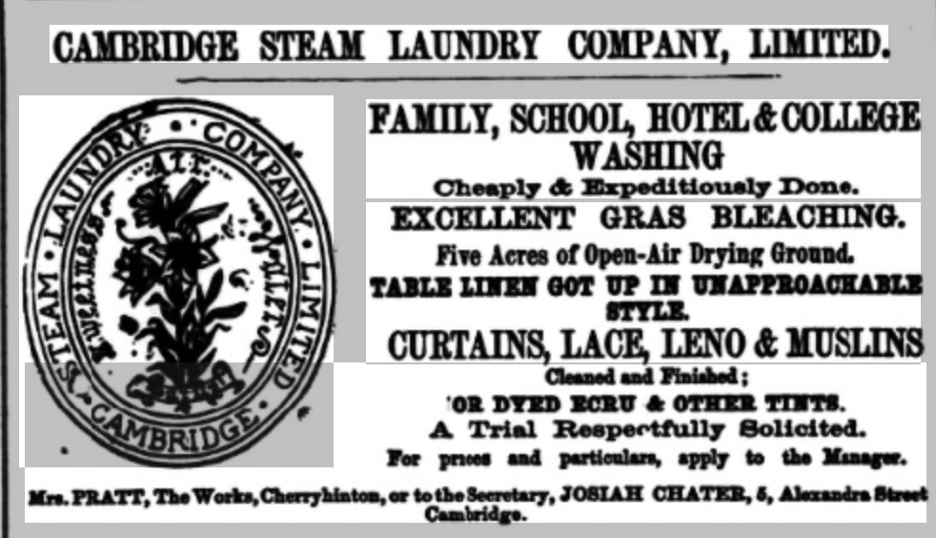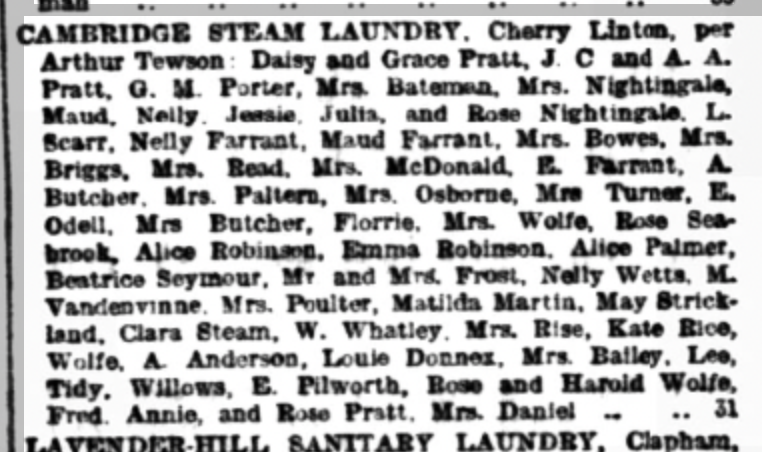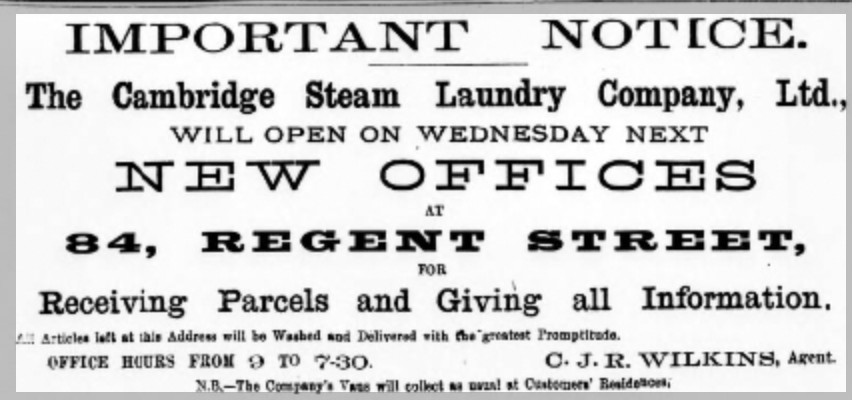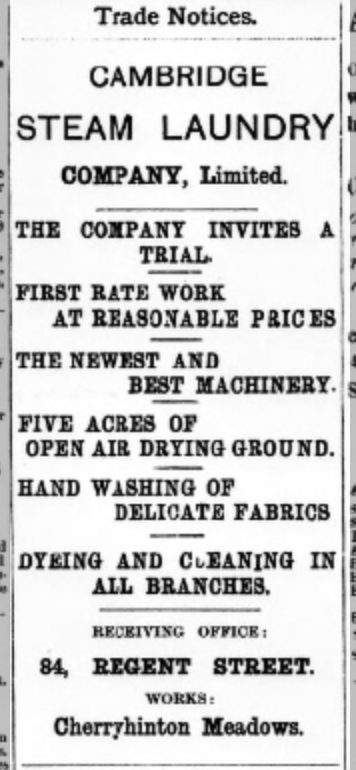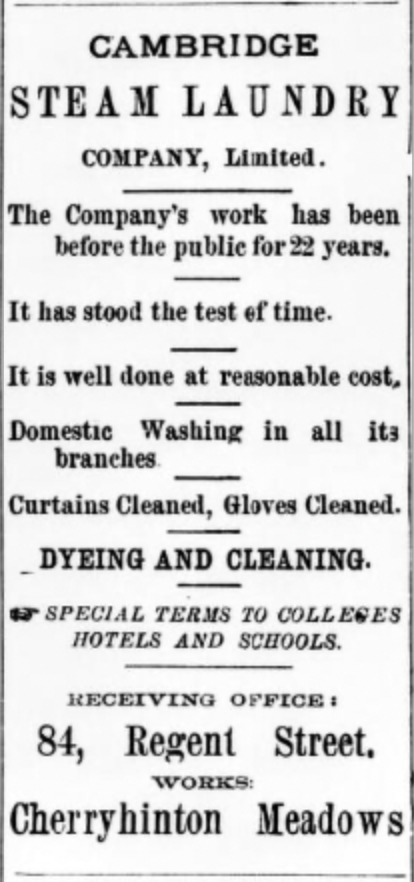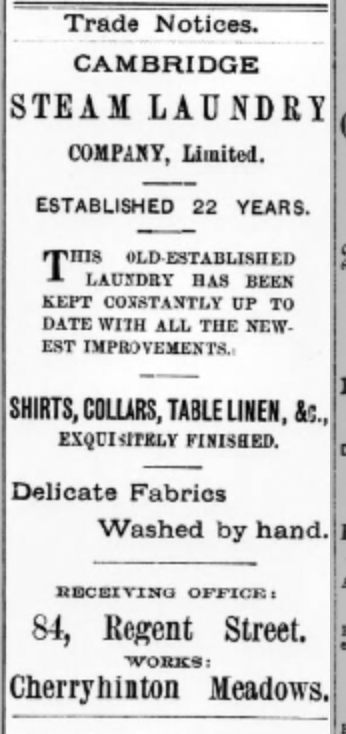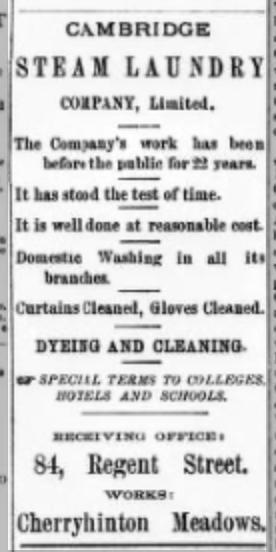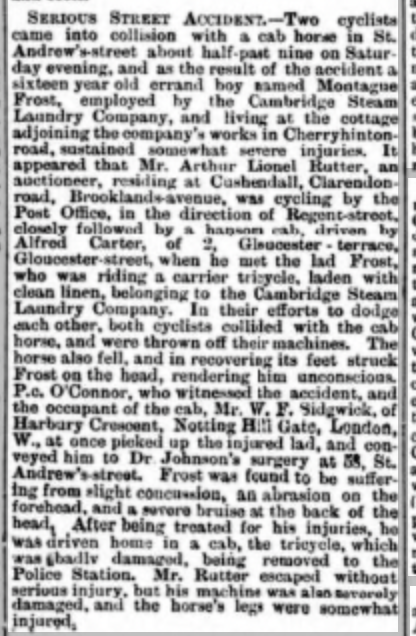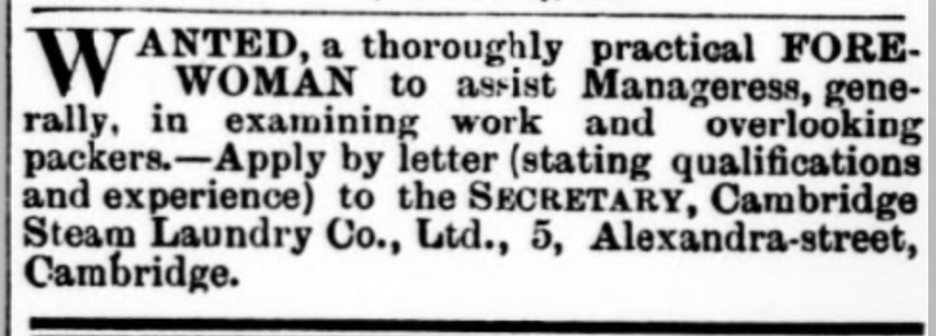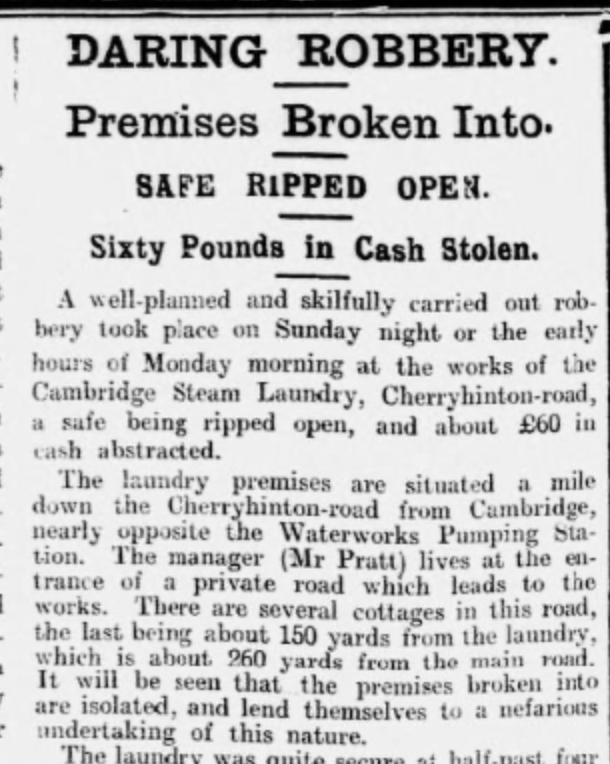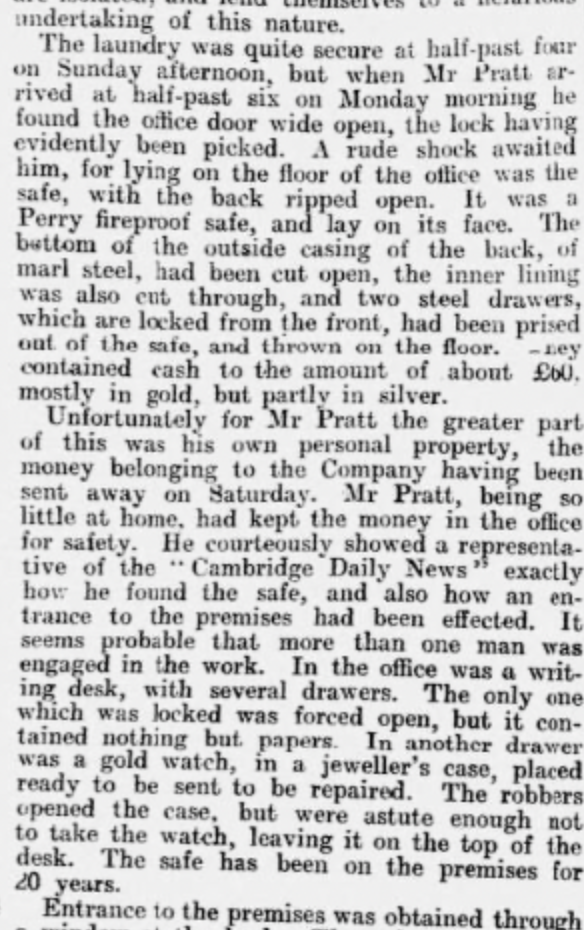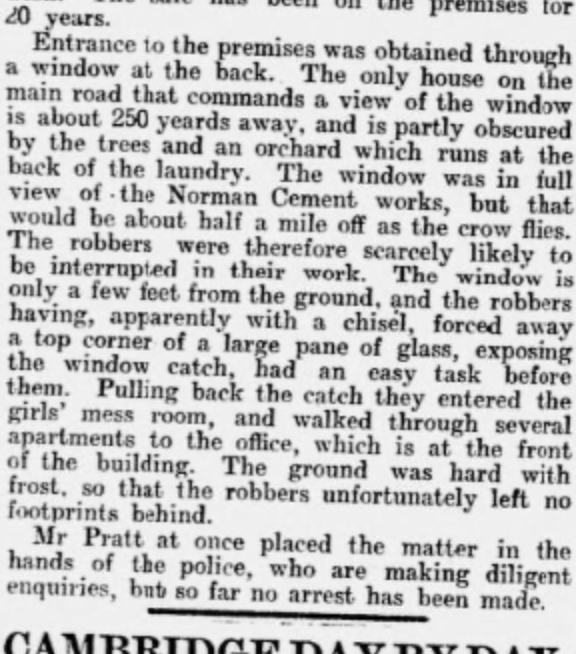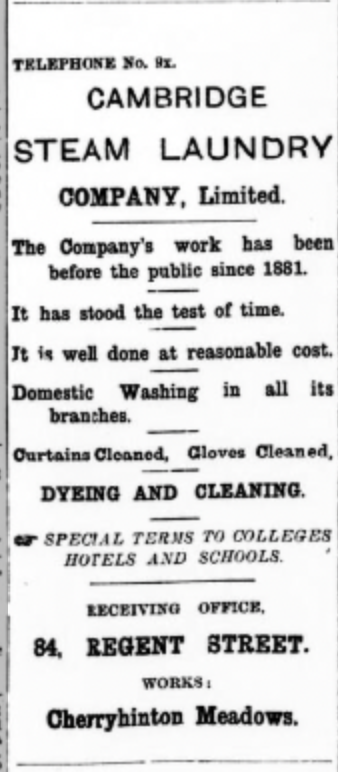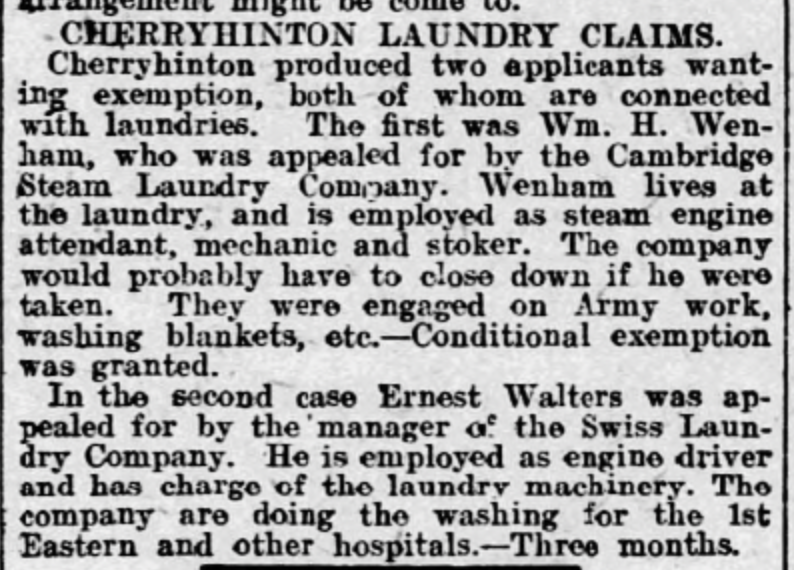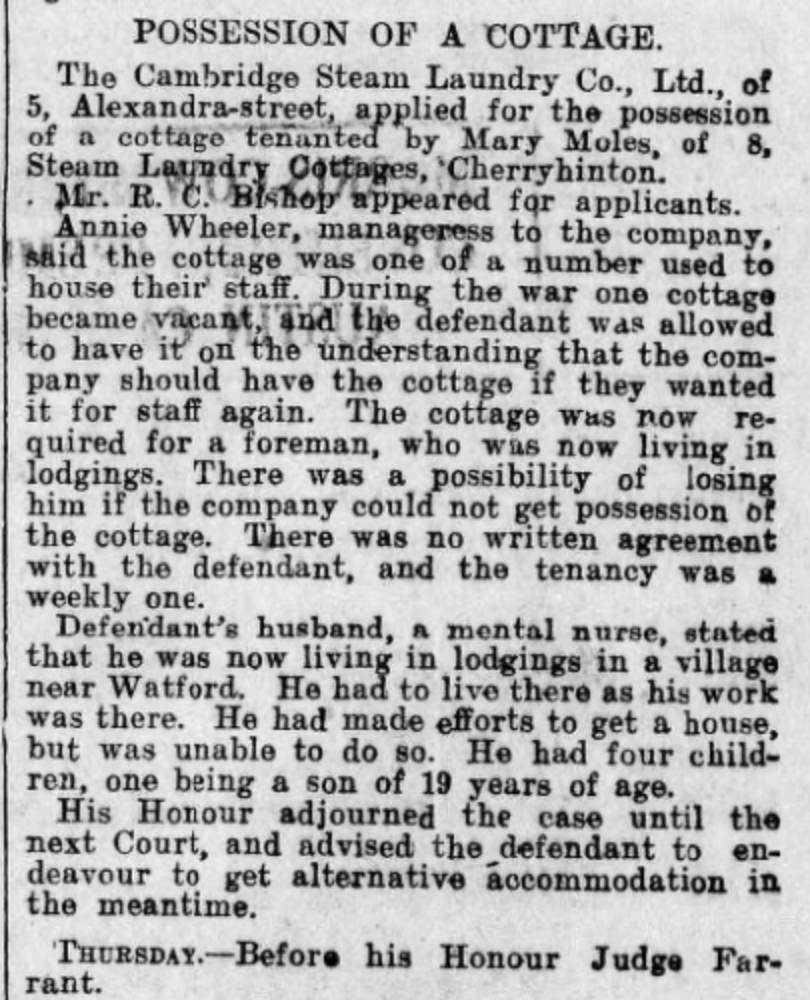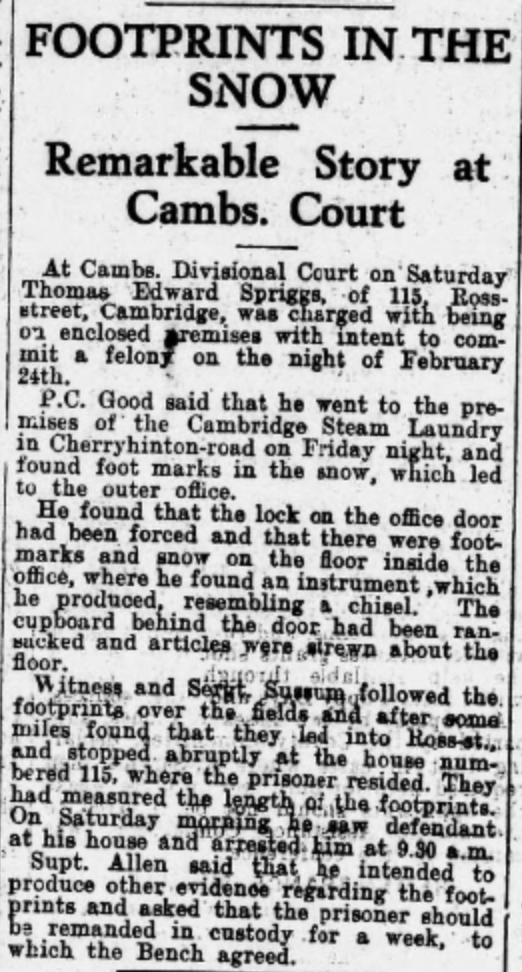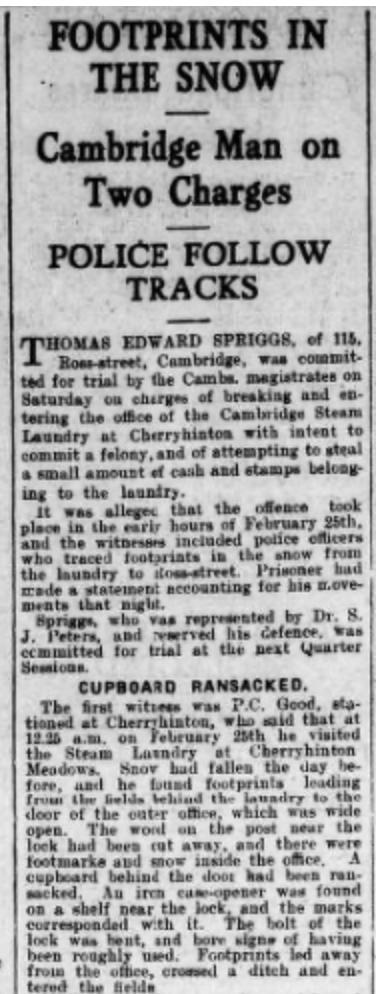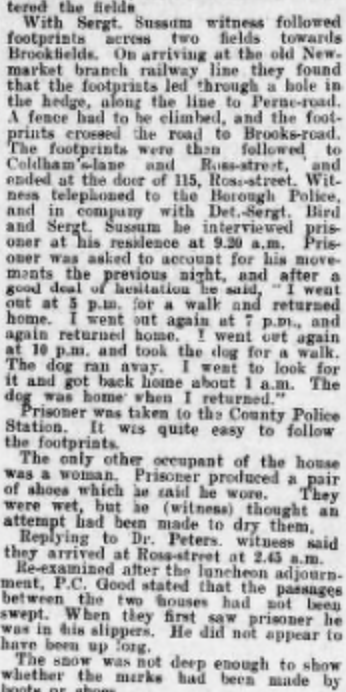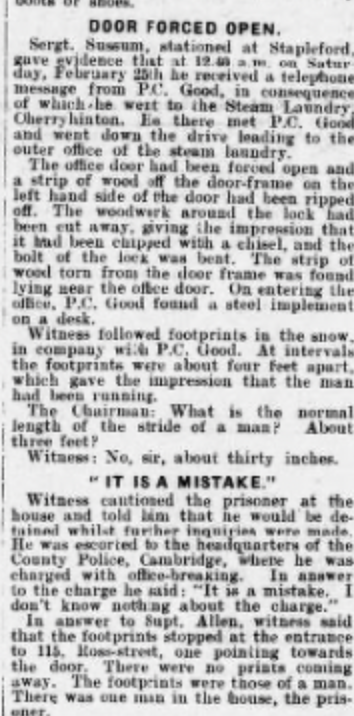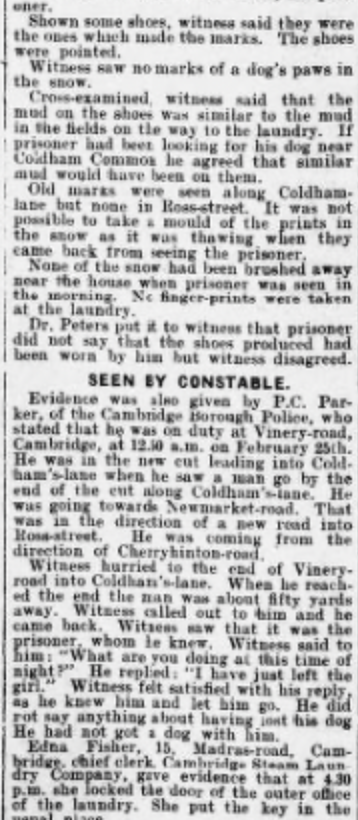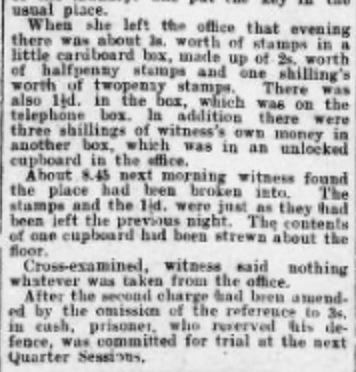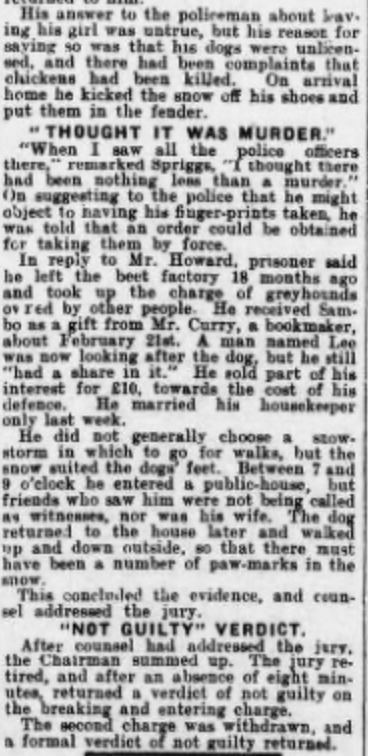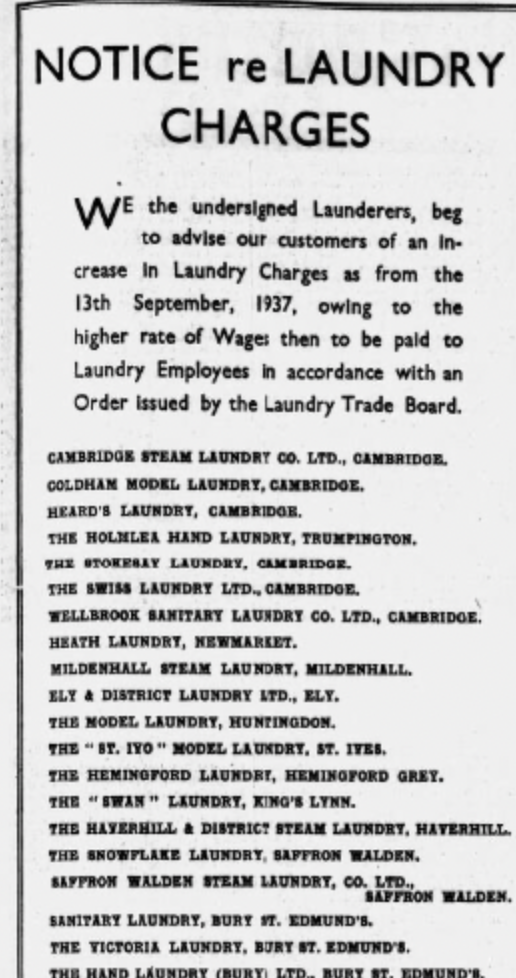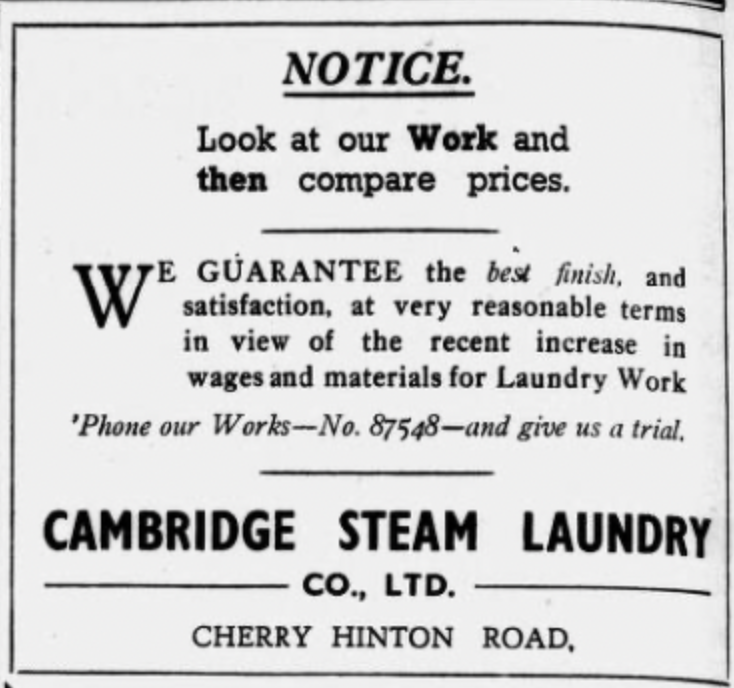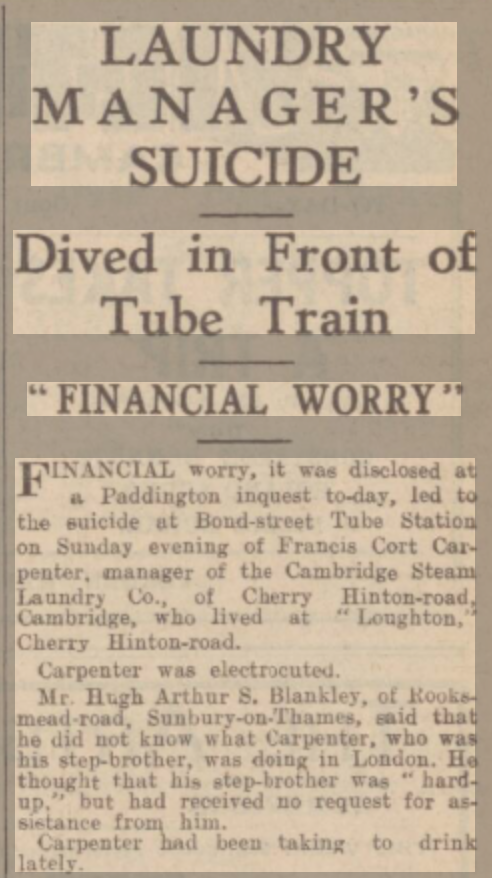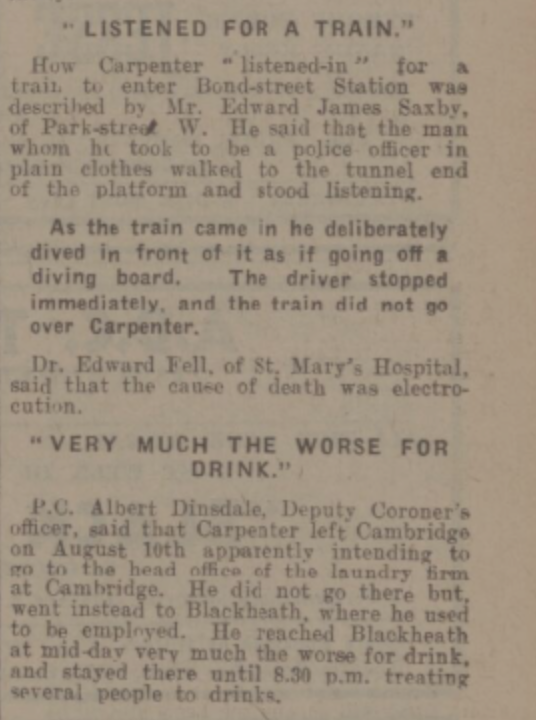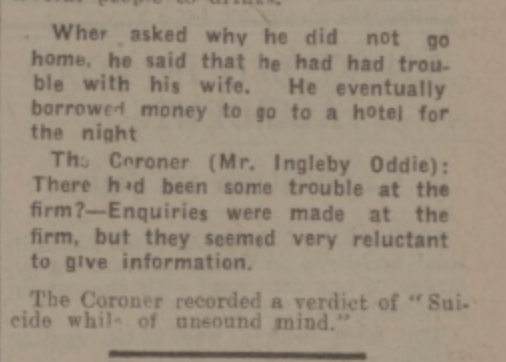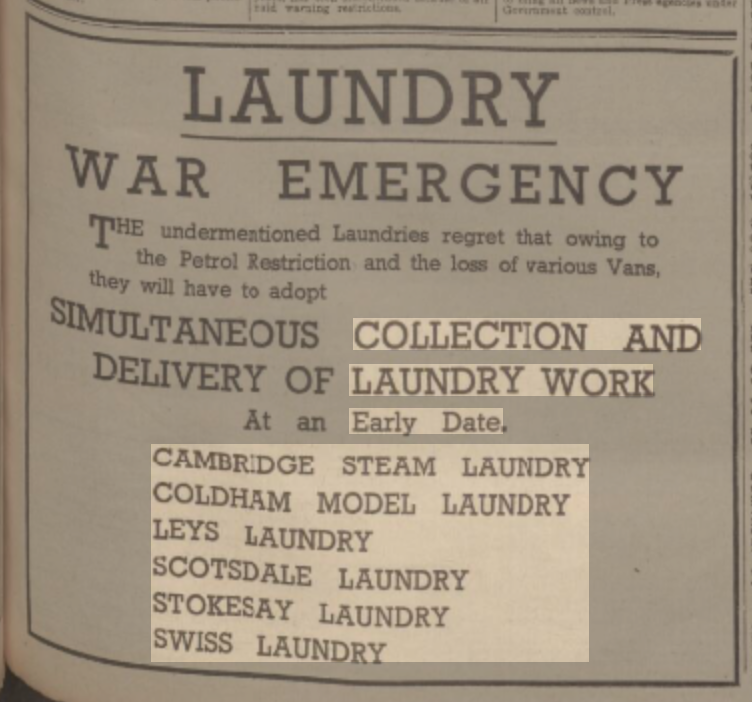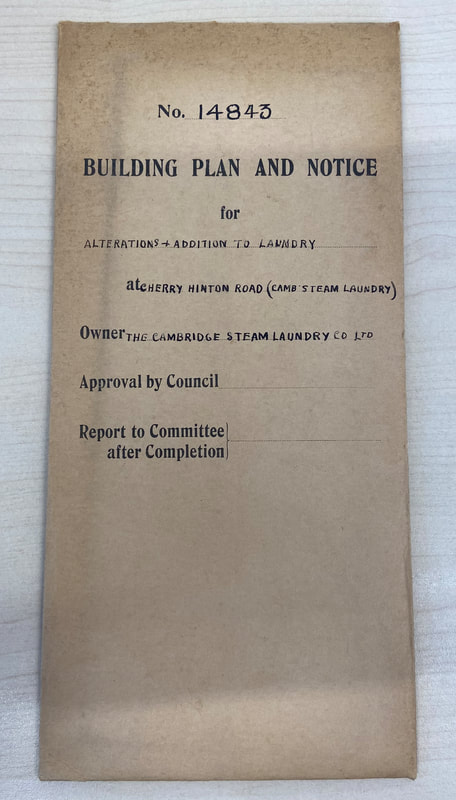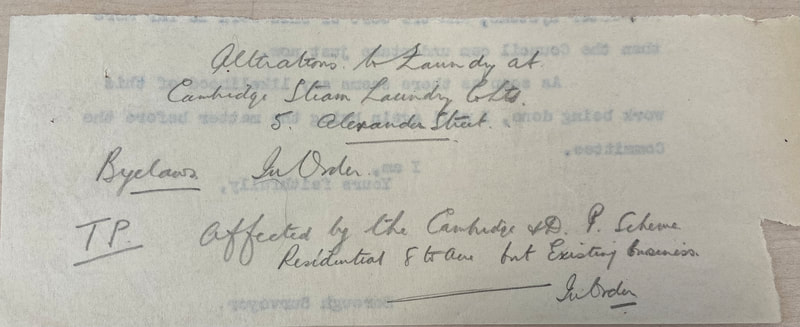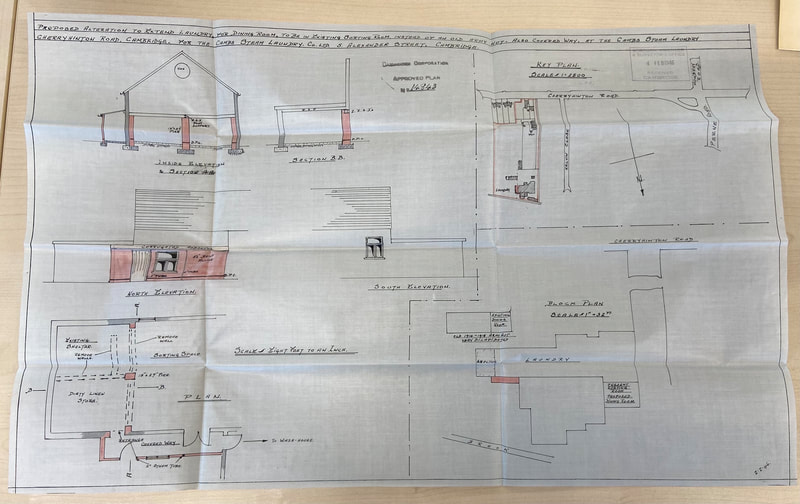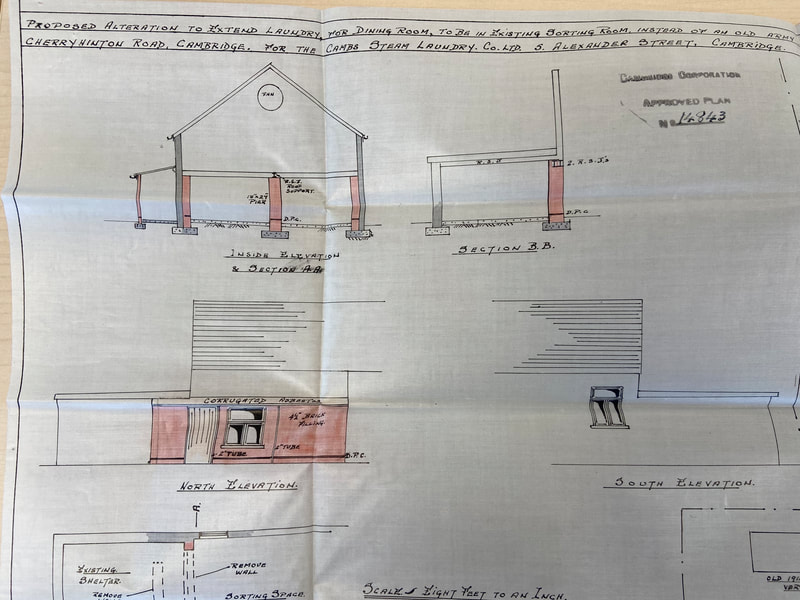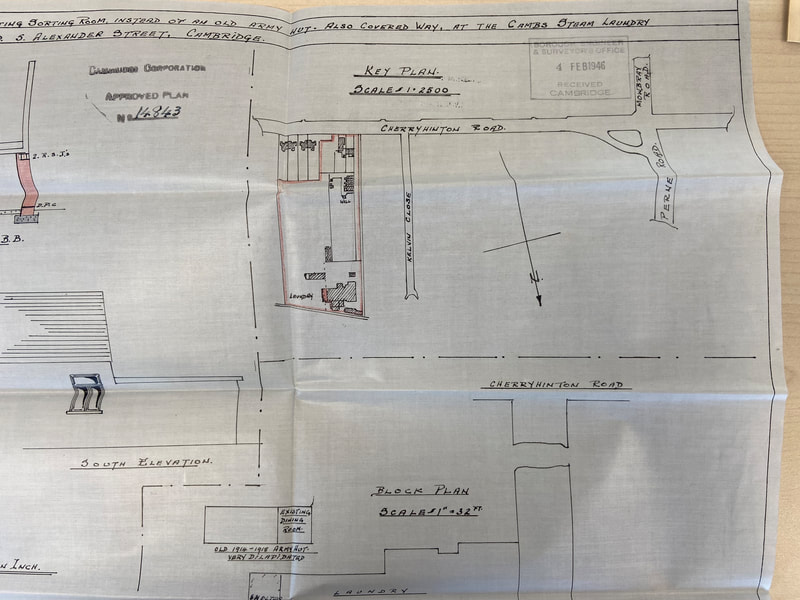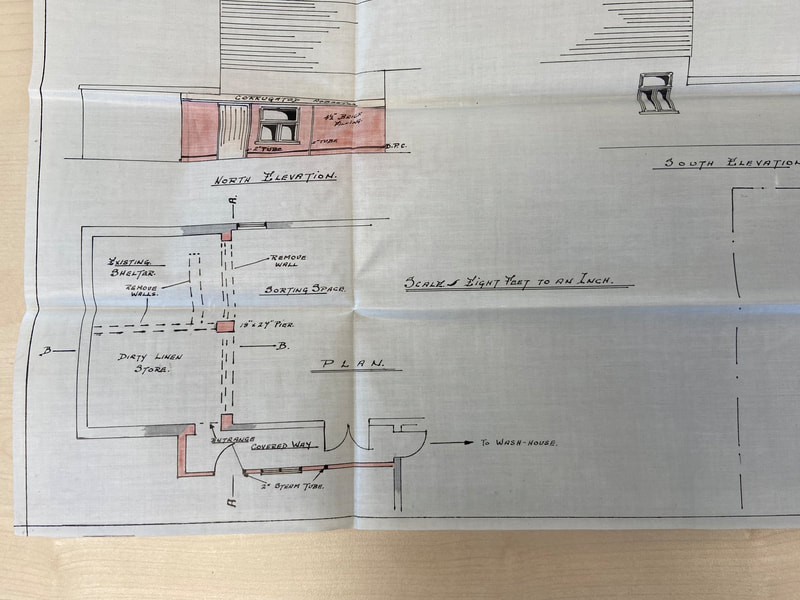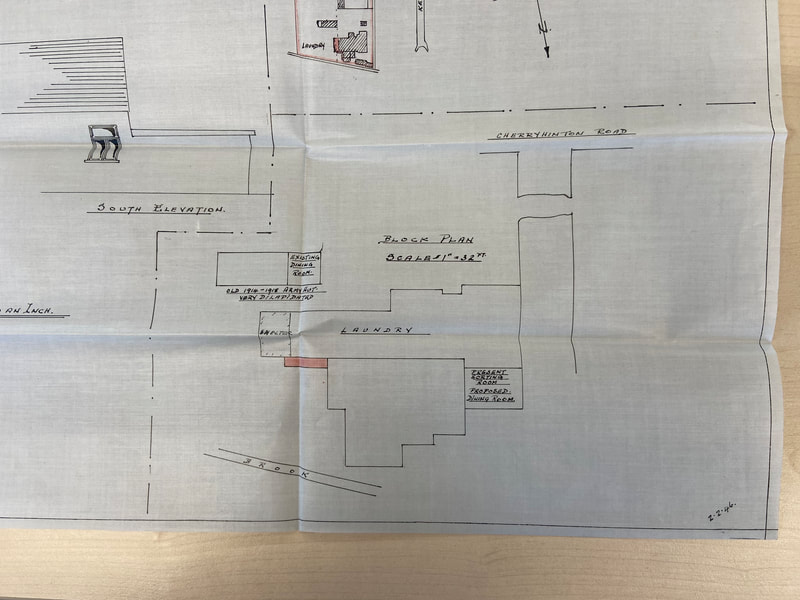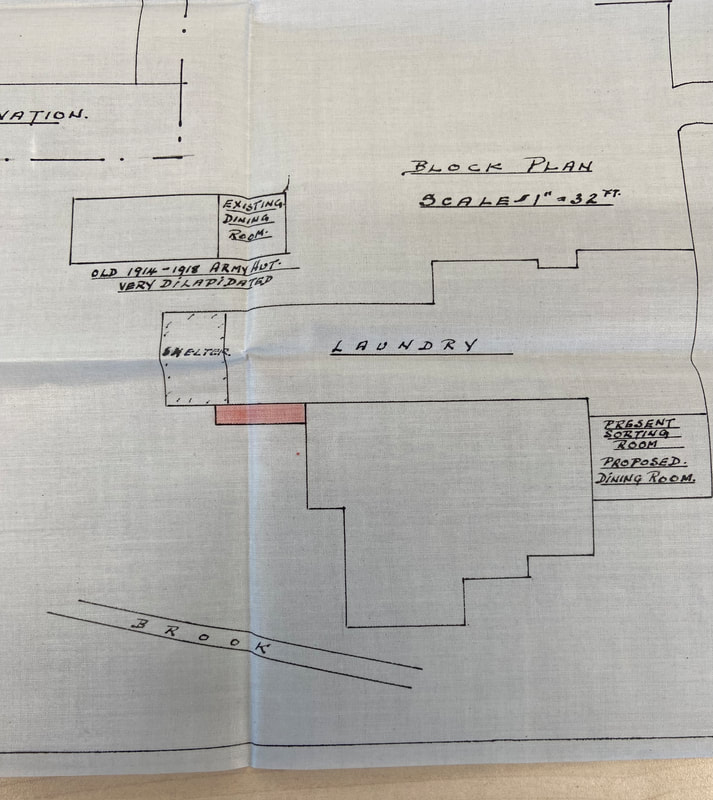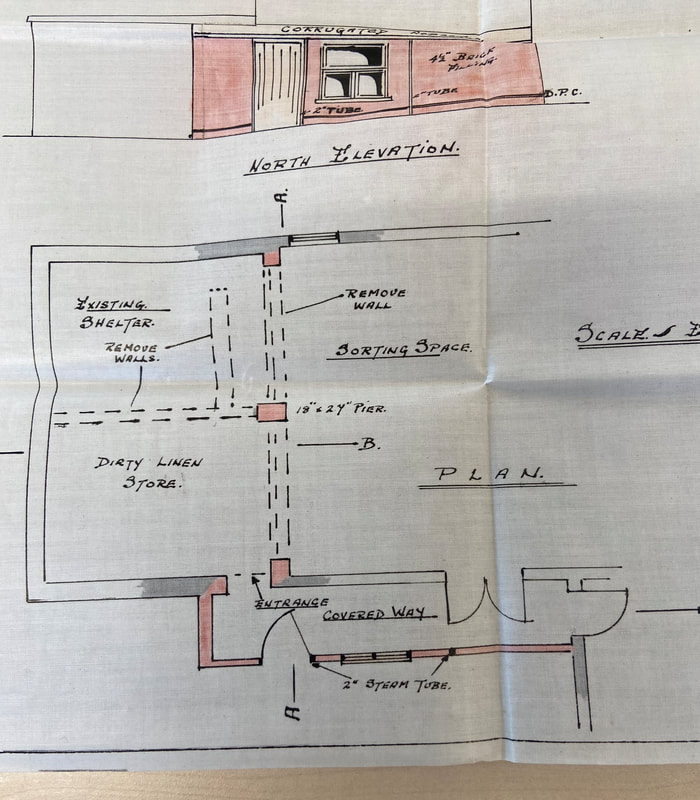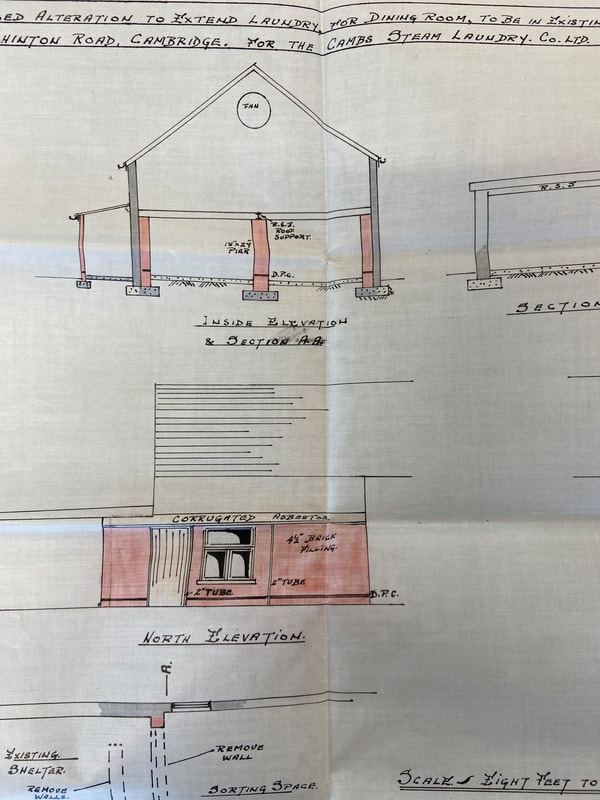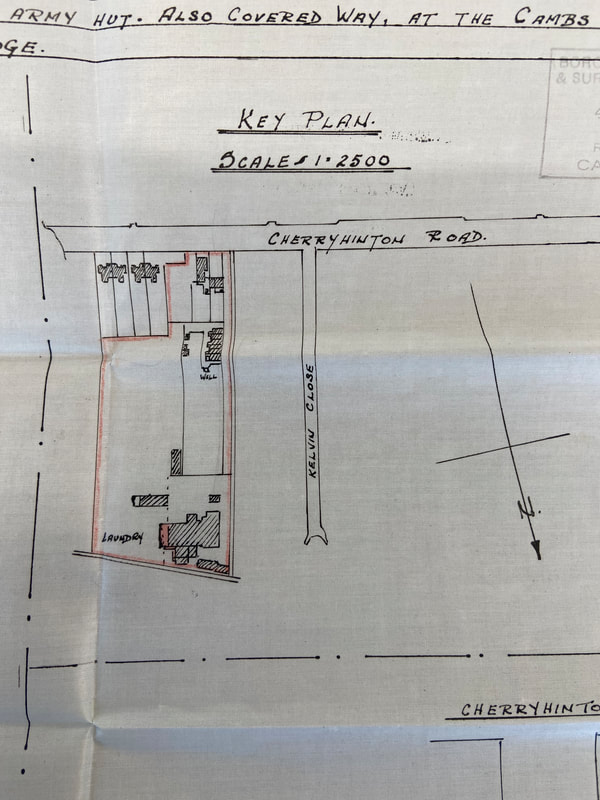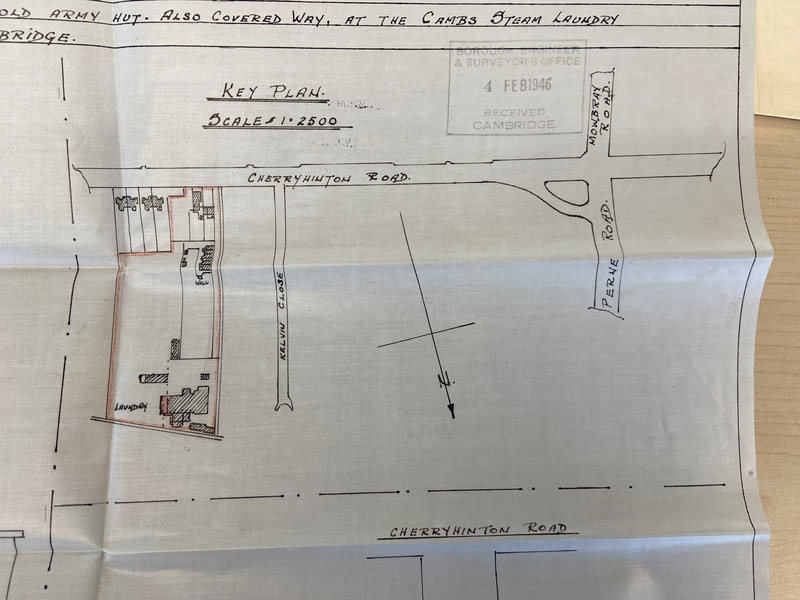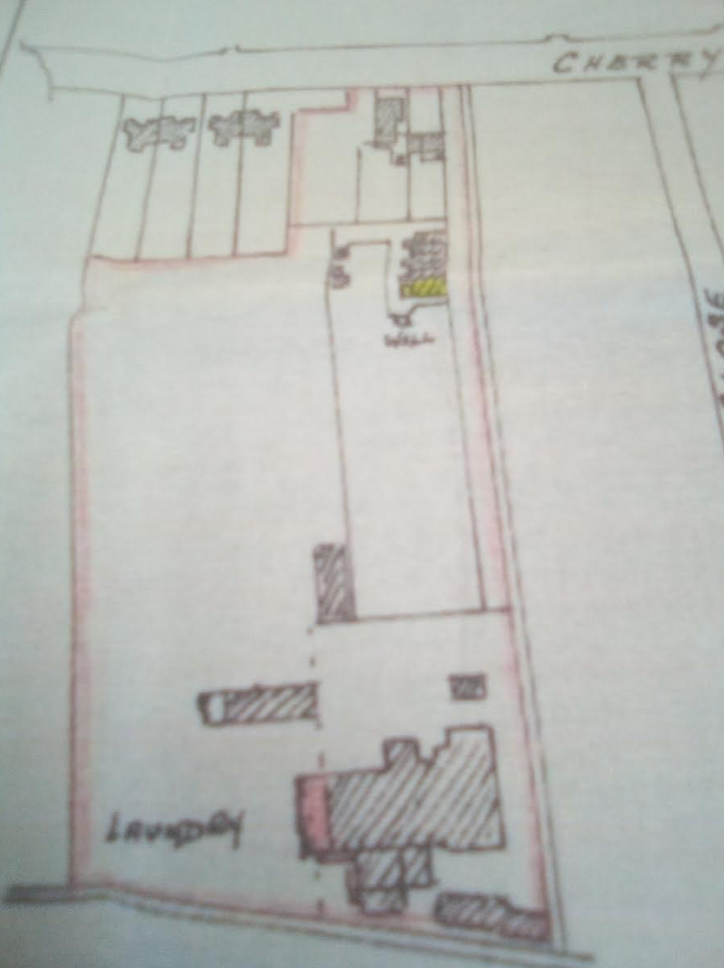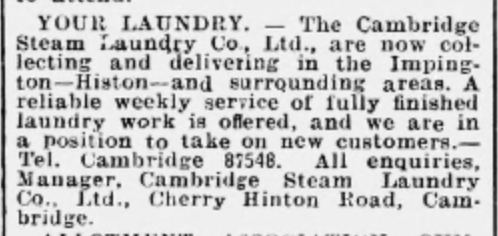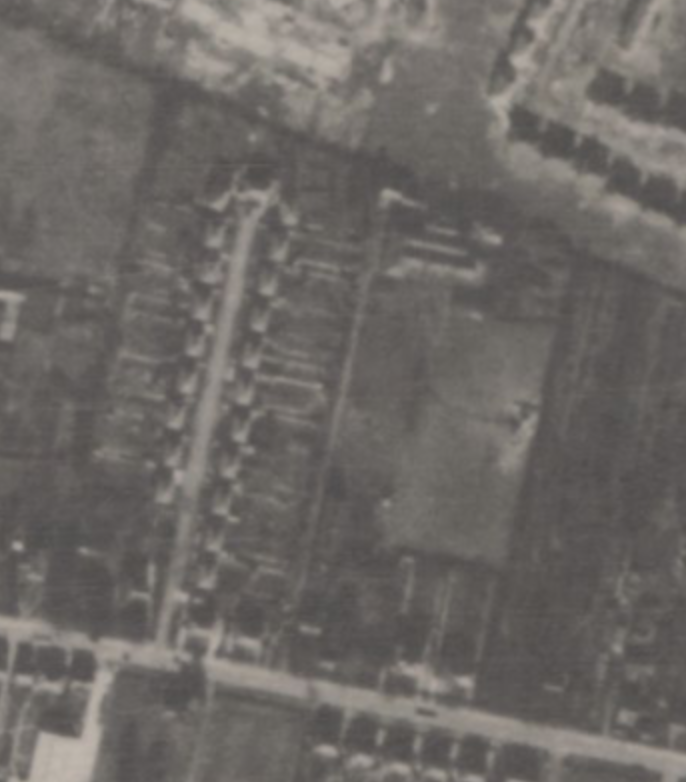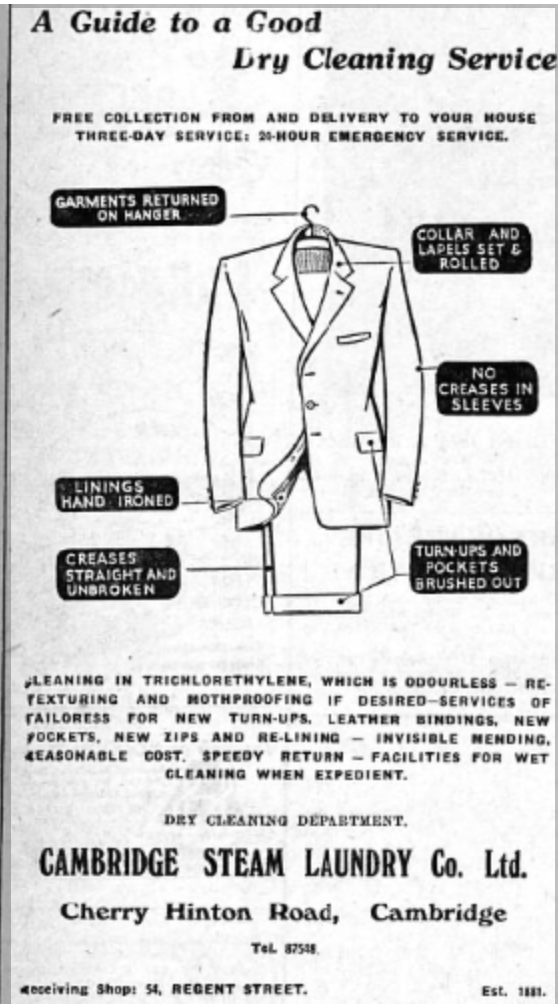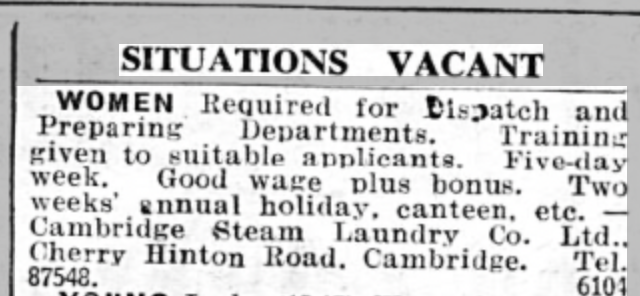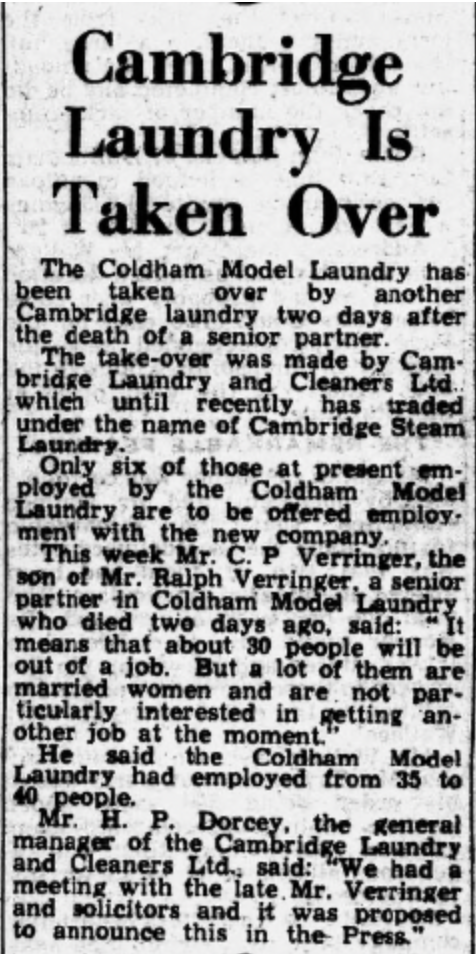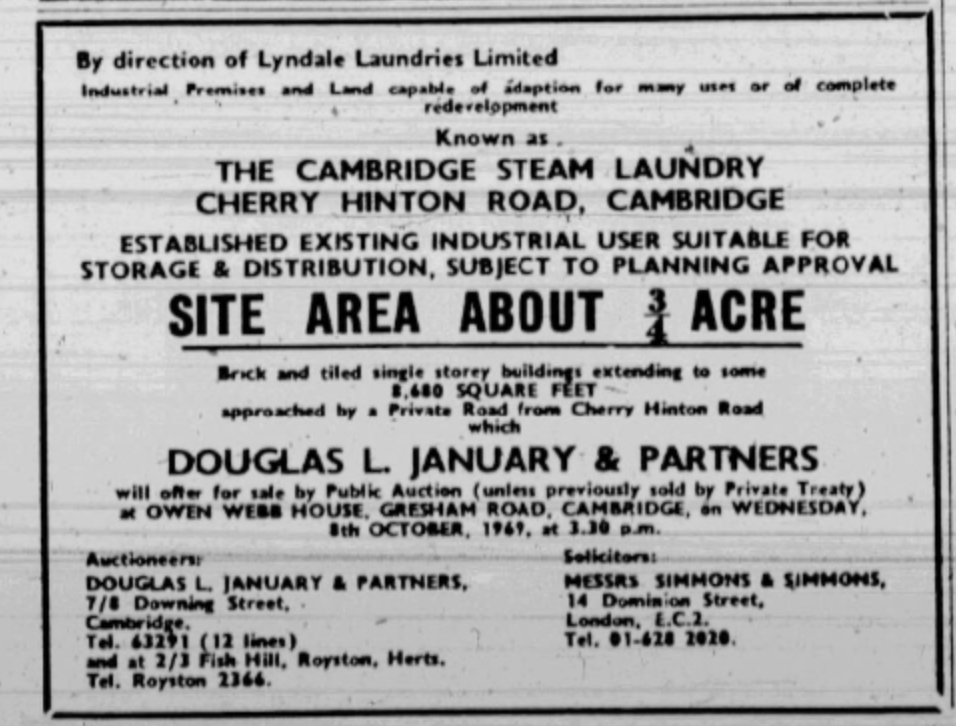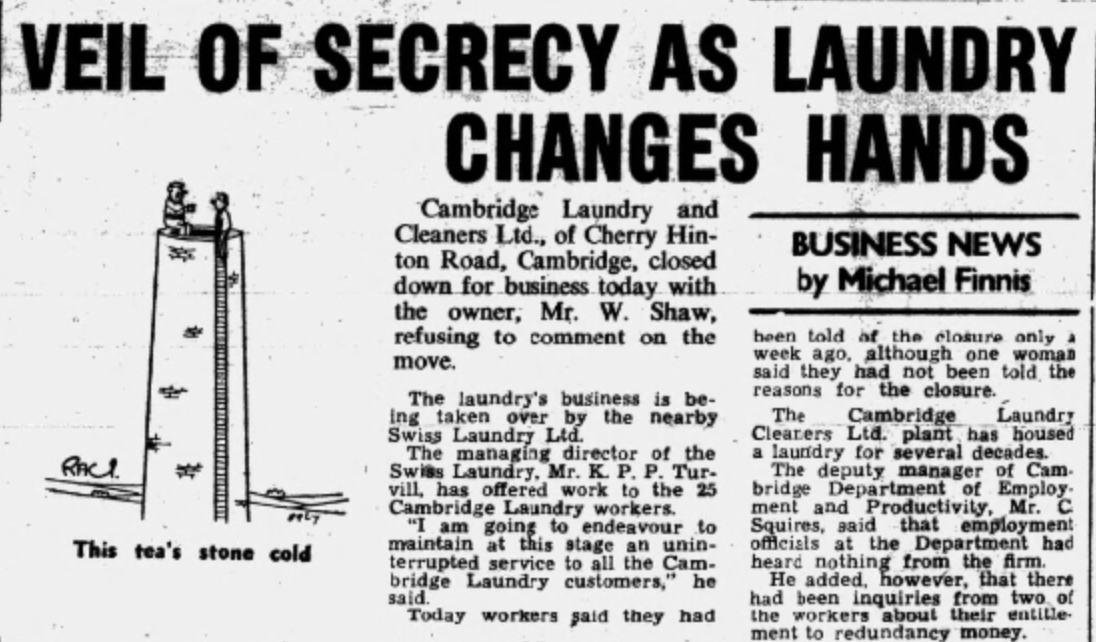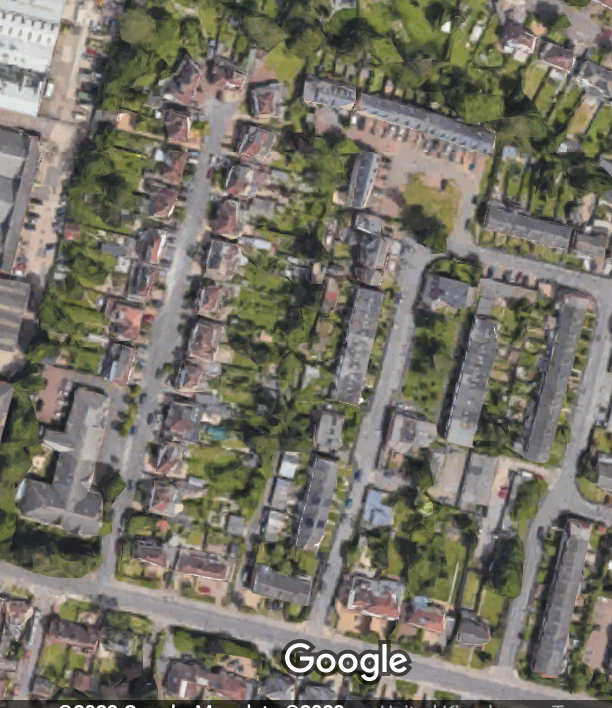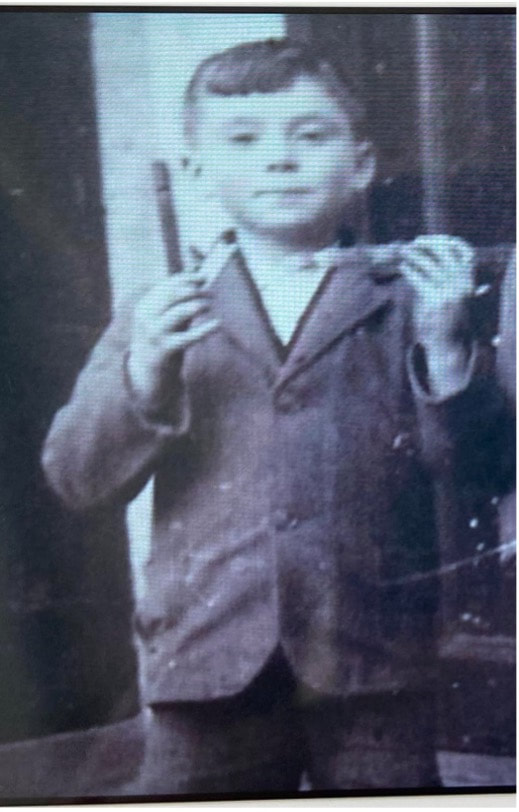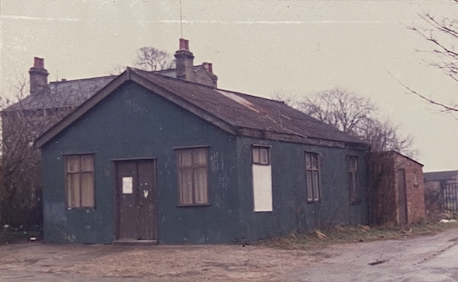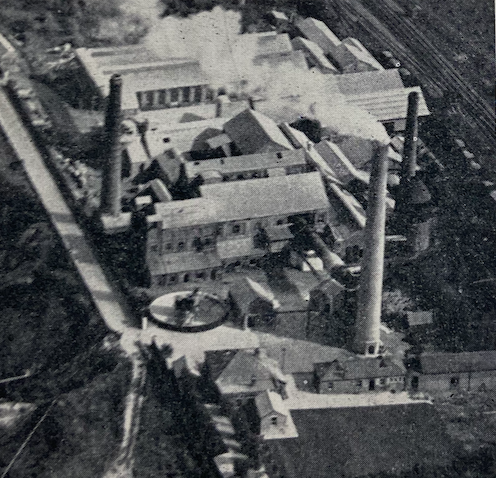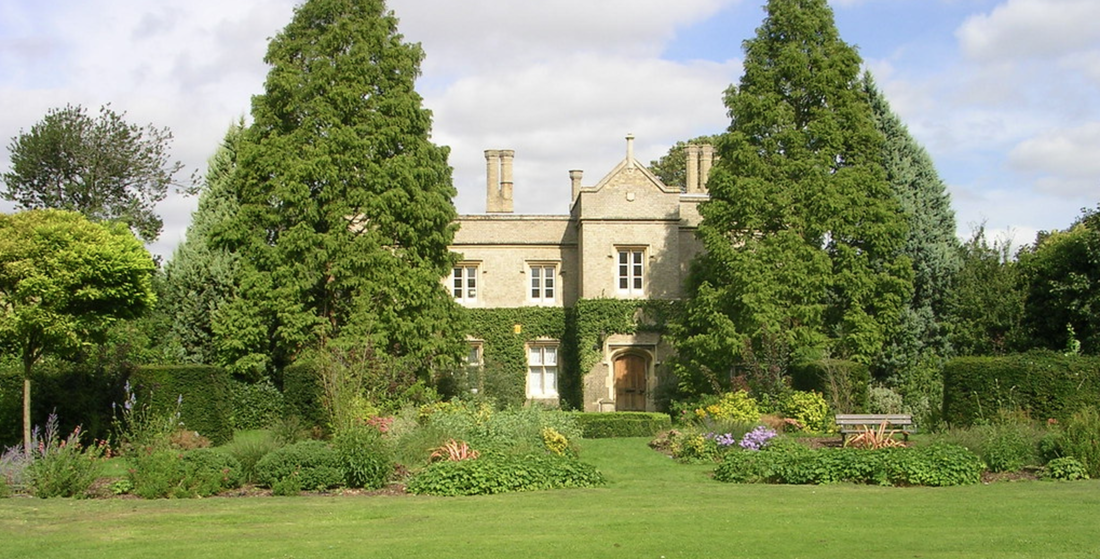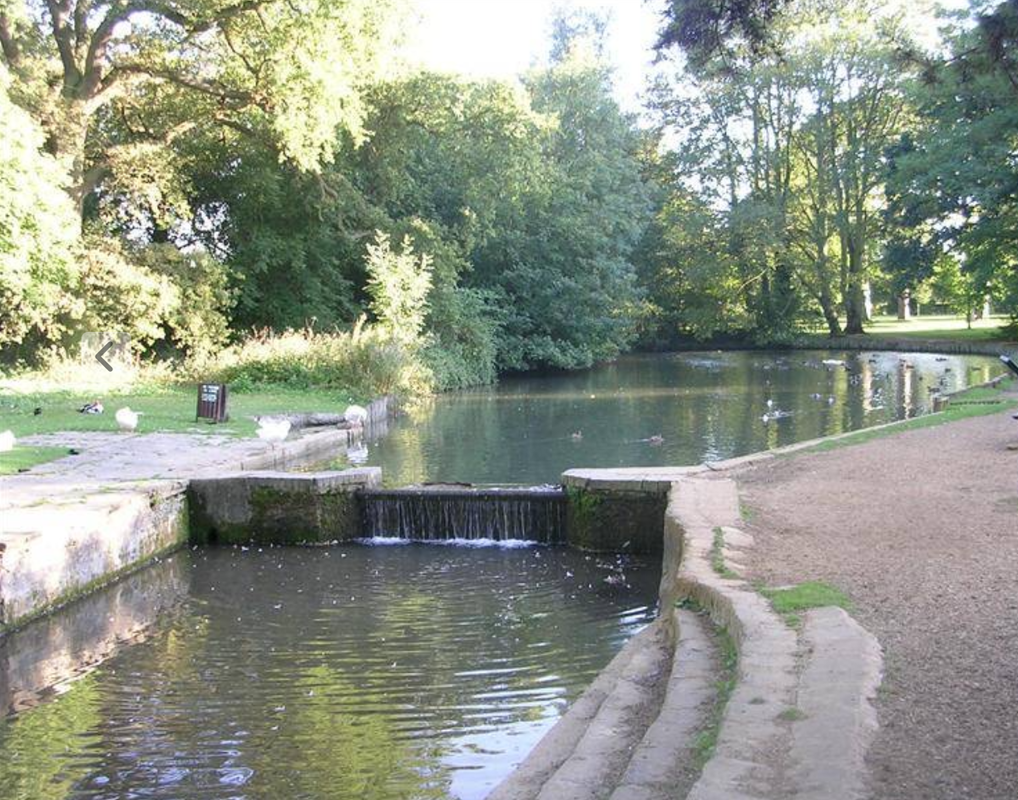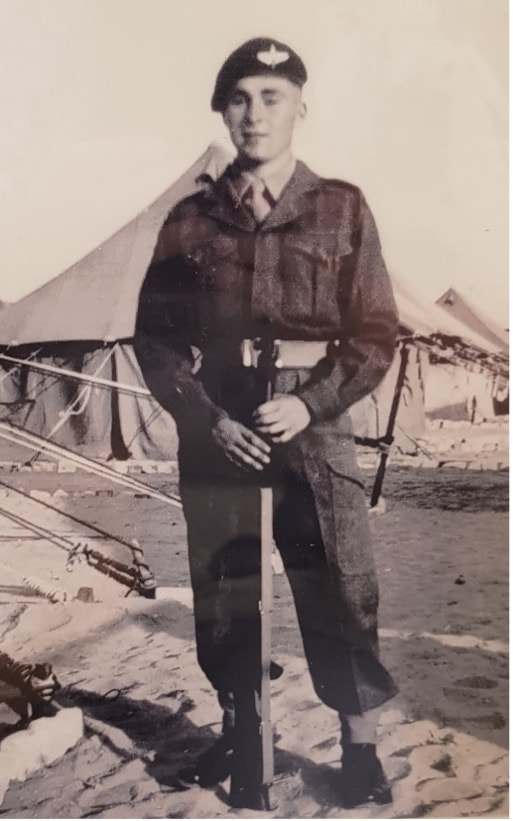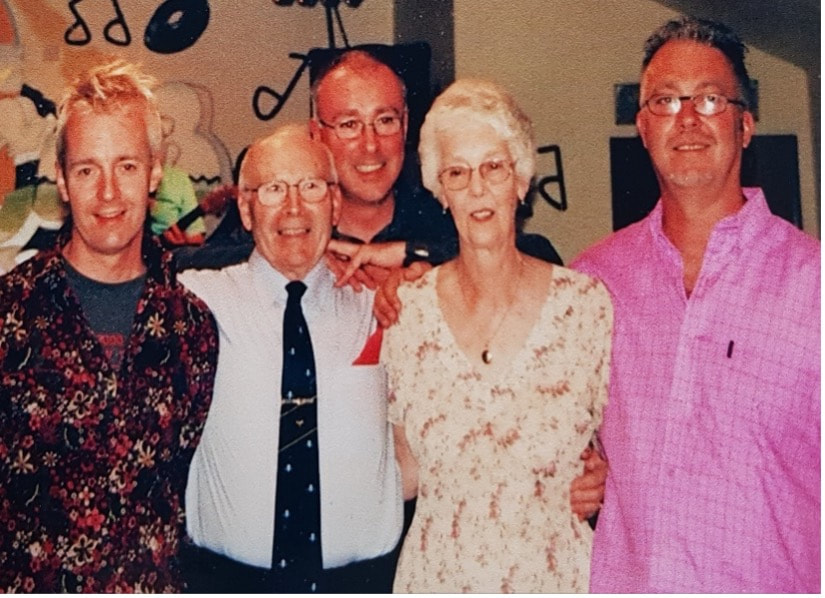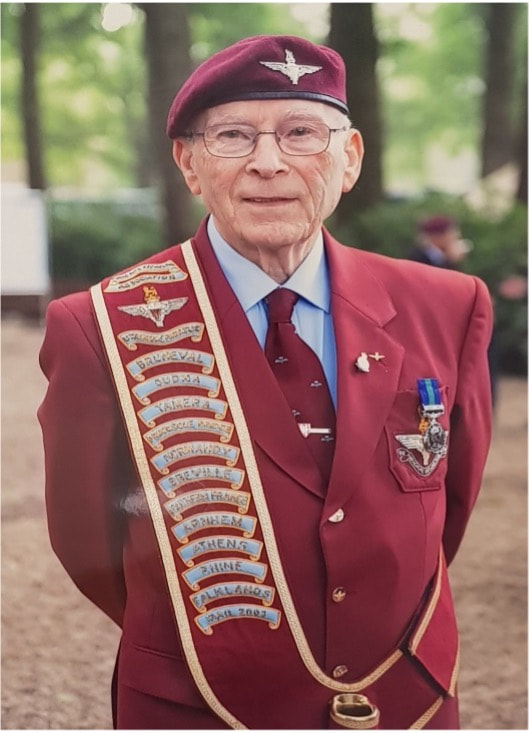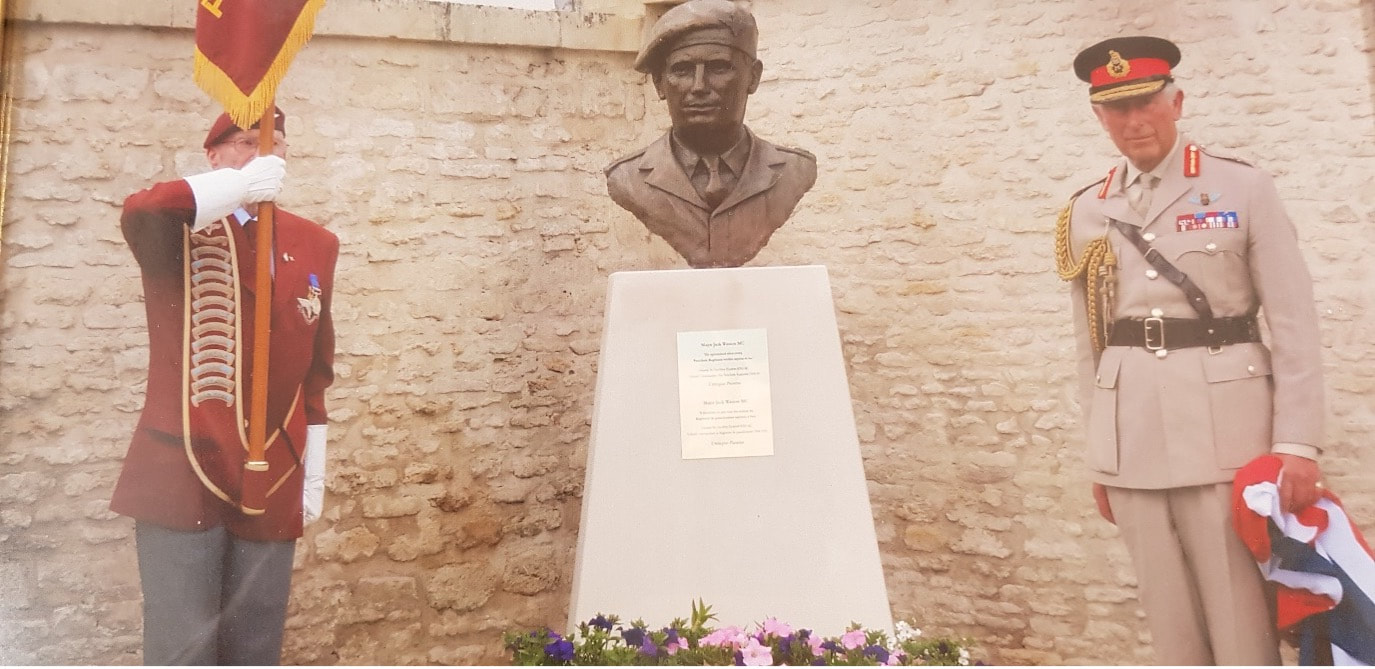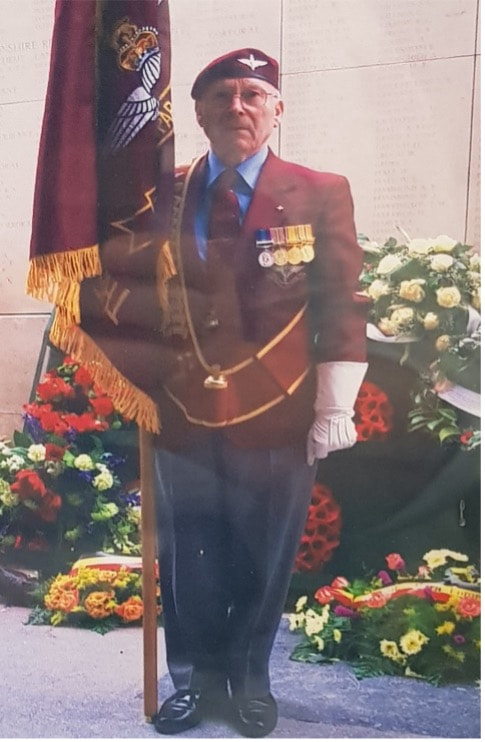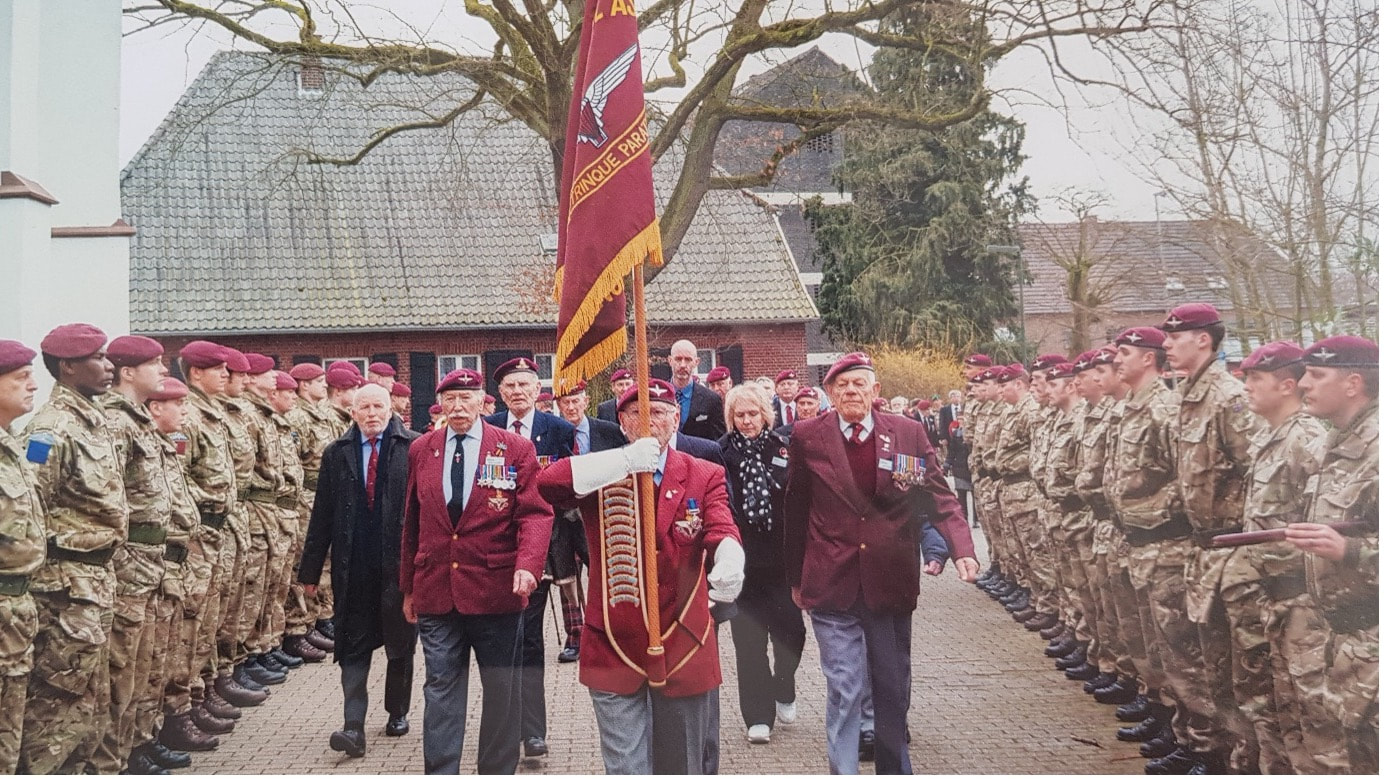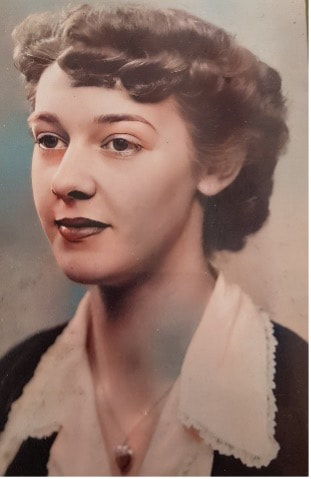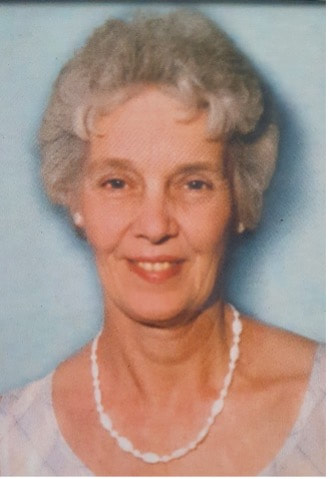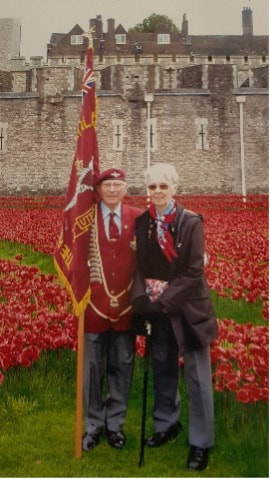|
Memories of Laundry Lane by Penelope (Penny) Jackson
My Early Life living in Cherry Hinton Road & Laundry Lane
Family
Ruby Gladys Jackson (Mum) William (Bill) Ernest Jackson (Dad) Sisters Ellen Margaret, and me Penelope
*All photographs included here are Penny's, unless otherwise stated.
I was born on 28.04.1948 at 141 Cherry Hinton Road where my family lived in a downstairs flat. I was the youngest of three girls, Ellen was the eldest, she was born in North London in 1940, Margaret followed in 1946 and I came along later in 1948. Margaret and I were both born at 141 Cherry Hinton Road. My parents decided after the 2nd World War to move away from London and make Cambridge their home.
I believe that my dad's first job in Cambridge was at the Swiss Laundry on Cherry Hinton Road, which was not far from our home. My dad was an engineer, and he eventually left his job at the Swiss Laundry and worked for the Cambridge Steam Laundry which was at the end of Laundry Lane off of Cherry Hinton Road in Cambridge.
The job came with a cottage which was located at Laundry Lane, our cottage was number 1 Laundry Lane which was the cottage nearest the Laundry, there were 5 other cottages and as far as I can recall, all were occupied by other laundry workers.
I recall that there was a family called Arnold who lived at number 3 Laundry Lane, Cecelia Arnold was the eldest and I think Len was her son, there was a young lady called Ella and I remember a young man called Ricki. At some point, there was a baby boy living in the Arnold household and I guessed he was Len's son, his name was Kevin.
There was a family whose surname was Cramer. I think the dad was Polish. I cannot remember his wife's name, but I remember he had 2 daughters. I think one of the daughters was named Barbara, the other I think was Marisha but I am not sure.
There was a family called Inskip but I cannot remember what number they lived at, but they had two children Michael and Christine. At the end of the row of cottages was a couple who did not have any children, they were Tom and Ivy Cordon, and I can remember when Queen Elizabeth was Crowned (1953) they let us children watch the ceremony on their TV because none of the other residents had one! They were also the only ones who had a car.
There was another little cottage in Laundry Lane, it was nearer to Cherry Hinton Road. There was a little girl called Freda Mauer who lived there with her parents, her dad's name was Steve.
Post-war, money was tight, but as a child, it seemed to be a happy community. At the back of the row of cottages, we all had back gardens and to the side of the houses was a plot of land which was turned into allotments for growing vegetables. There was also a well on this piece of land.
Beyond our back gardens was a big field, where in the summer the children used to play during the school holidays. In early summer the field was covered with cowslips, which today are still my favourite flower. The boundary of the field had a row of trees and beyond the trees was Coe’s Farm. Mrs Coe ran a shop, the front of which was on Cherry Hinton Road. The shop was opposite where the TA is now.
(* You can read more about the Coe's by clicking here: Lime Tree Farm and the Coe Family, Cherry Hinton)
Ellen went to Morley School and when she left there she went to Coleridge School. With all the building that was going on in this area two new schools were built, Queen Edith School and Netherhall Secondary School. Margaret went to Morley School but when Queen Edith was built, she moved there and then went on to Netherhall. I went to Queen Edith and then to Netherhall, but we both hated school.
In the Early 1960s, I am not sure of the date, but I know I was at Netherhall School at the time, we learned that the field that was playing field, at the back of the cottages had been sold and houses were to be built, and Derwent Close was born, building proceeded and we were surrounded by a building site. At the time it seemed like a huge number of houses were being built, but worse was to come, the houses that we lived in were to be demolished to be part of the new build, I think there are garages where our houses used to be. The workers from the Laundry were given new homes on Derwent Close, wonderful we thought, brand new houses with a bathroom! I can remember our old cottage being demolished, Margaret and I watched out of our new bedroom window, and we could see all the pictures of pop stars still clinging to the walls of our old bedroom as they demolished the cottages.
I was 14, Margaret had left school and had a job and Ellen had been married for a couple of years and they lived in a flat in Station Road. Dad came home from work one night and he had to tell us he had been made redundant from his job, so he had to find us somewhere else to live. Margaret and I were really upset, we did not want to move!
But Dad sorted it out, he got another job, at the Cambridge pumping station (now the Museum of Technology) , and the council rented us a house, but the house was on the other side of town, Arbury Estate, it seemed miles away from our friends, but there was no other option. It was winter 1962 when we moved, Dad and Margaret had to go to work, so Mum and I had to sort out the moving, we had a removal company move us, and when they had finished, I had to take the key to the house back to the manager of the Laundry, I think his name was Mr Dorsey. We then ordered a taxi and together with the cat and Tinker the dog we arrived at our new home. It was freezing cold, the house was brand new, and I think it was colder inside than out. Dad eventually ended up working for the University in the Engineering Department, being in charge of the boilers in the teaching lab.
So, our new life began. The next morning it was freezing cold, but my sister had to go to work and I had to go to school. But to go to Netherhall school involved 2 buses each way, nightmare!
Christmas came and went and School Easter Holidays in 1963 were on the horizon, I knew I did not want to stay at school any longer, so I went to talk to the Head Teacher of Netherhall at the time, Miss Wilkinson, I told her I wanted to leave school, but she said I was only 14 and could not leave. She looked at the calendar and said, you will be fifteen in the Easter holidays, if you find a job that you can start when you are fifteen you can leave. That is what I did! Murketts Motor Vehicle Company had a repair workshop in Histon Road and I became a receptionist, telephonist and general office worker. It was a bit of a shock as I was very shy, and most of the staff were men.
Looking back, I had a very happy childhood, we did not have much money, but we had a good time, and we made the most of what we had. Looking at the recent pictures that my husband Nick took the other day of Laundry Lane, it made me sad to see how neglected it is now. But that is progress for you! After my marriage to Nick in 1968, our first home was at Swann’s Terrace (off Mill Road) before moving to Shepherds Close Cherry Hinton where we resided for 45 years bringing up our two boys before moving to Church End in 2015.
Penny Nicholas (Jackson)
18.09.2023
The Laundry Lane / Arnold Layne Pink Floyd Connection.
Added by D J (Nick) Nicholas
The story of the Pink Floyd song Arnold Layne has never been fully explained, and probably never will, the Lane although called Laundry Lane had so many Arnolds living there in the very early days, it was called (unofficially) Arnold Lane. If you listen to the lyrics of Arnold Lane by the Floyd, you will gather that it is pertinent to an individual (known to the police) as an alcoholic, and a thief who stole items of clothing from the washing lines in the area, it is believed he was an Arnold (one of the many that lived in the Laundry Lane cottages) and as the nearby Homerton Colleges had lots of ladies lodging in the area, it was a like a child in a sweet factory, with an abundance of quality undergarments to pilfer. He also had an illegal still in a shed at the back of the cottages where he brewed illegal hooch and sold it on.
The connection here is that Kevin Arnold was a friend of Roger (Syd) Barret and it was one of Kevin's relatives that was the perpetrator of these acts. Obviously he not only stole ladies' clothes, but men's attire as well, as it is rumoured that Syd Barret was one of his customers, (Syd being totally unaware of where the booty came from) He was eventually caught and served time for his misdemeanours. Hence it can be assumed that Syd used this knowledge to pen the song, Arnold Layne. Below I have written down an abridged version of the lyrics. Arnold Layne had a strange hobby Collecting clothes Moonshine, washing line They suit him fine On the wall hung a tall mirror Distorted view See-through, baby blue He dug it Oh, Arnold Layne It's not the same Takes two to know Two to know Why can't you see? Now he's caught A nasty sort of person They gave him time Doors bang, chain gang He hates it Oh, Arnold Layne It's not the same Takes two to know Two to know Why can't you see? The song was Pink Floyd's 1st Single and was recorded on Feb 8th & was released on the 11th March 1967. DJN (Nick)
Michelle's Notes - A draft History of Cambridge Steam Laundry:
Laundry work was a traditional trade in Cherry Hinton, usually carried out by women of the village. The main clients were the colleges of Cambridge University, but the laundries also served local hotels, schools and families.
Before motorised vehicles, the washing would have been delivered and picked up by horse and cart or donkey and cart.
With the rise of the steam-powered industry in the later Victorian period, the traditional manual laundries were overtaken by mechanised steam laundries. With the establishment of the Cambridge Steam Laundry in 1881, in the fields west of Cherry Hinton village, much of the trade soon diverted there.
1881
The Steam Laundry was built in Cherry Hinton parish on the site of an old brewery and was opened by 18th October 1881 for business. It included a large area of drying ground. Further research is needed to learn more about the brewery that is said to have once stood on this site.
Cambridge Steam Laundry was established in 1881 by Ginn, a Cambridge solicitor, who made Josiah Chater the secretary of the newly formed company. Newspapers reported on the formation of the new public company by March of 1881.
You can read more about Samuel Ginn here:
https://en.wikipedia.org/wiki/Ginn_%26_Co_Solicitors
Capturing Cambridge are currently transcribing and publishing the diary of Josiah Chater - you can find out more about this on their website here:
https://www.museumofcambridge.org.uk/2022/07/josiah-chaters-diaries-a-glimpse-back-in-time/ They state that: "Josiah Chater records in his diary the establishment of the Steam Laundry Company. On 11 Feb 1881 he writes: "Had a pipe with Ginn the solicitor; he told me about a new project of a Laundry Company he had in view to which I am to be secretary if it comes off. He has the offer of an estate of 4 acres, with buildings on it, at Cherryhinton, opposite the waterworks, and he has a capital man in view as a manager." Josiah was appointed secretary and the first meeting of the directors was on 5th March. It was decided to demolish the brewery which had stood on the site; by 18th October the laundry opened for business. The first customers were Cavendish College and Mrs Todhunter, wife of Isaac Todhunter, honorary fellow of St John’s College. Josiah as secretary was paid £25 per year, the manager was paid £1 per week and the manageress £1 10s per week.
By February 1882 there were problems though. Josiah found the books in a bad state and did not think that the manager and his wife were competent. There had been many mistakes in sending linen back home. Eight cottages for workers had been built near the laundry and a Dr Cunningham, a graduate of Harvard then living in Cambridge, had been consulted on the problem of disposing of the soap suds without interfering with the sewage system." (Capturing Cambridge)
1882
In January 1882 we find evidence of the trouble referred to by Josiah above, in the form of an advert for a Forewoman for the Laundry who "must understand book-keeping":
By March 1882 we begin to see the first advertising for custom by the new Cambridge Steam Laundry Company. The advert below ran for several months in various publications.
The advert above states that full information may be obtained from No. 2 Alexandra Street, Cambridge. This was the office of the Cambridge Reform Building Company. This office was given up quickly because it was too small and moved to 5 Alexandra Street.
You can read more about Alexandra Street on Capturing Cambridge here: https://capturingcambridge.org/museum-of-cambridge/museum-exhibit-stories/7-alexandra-street/ 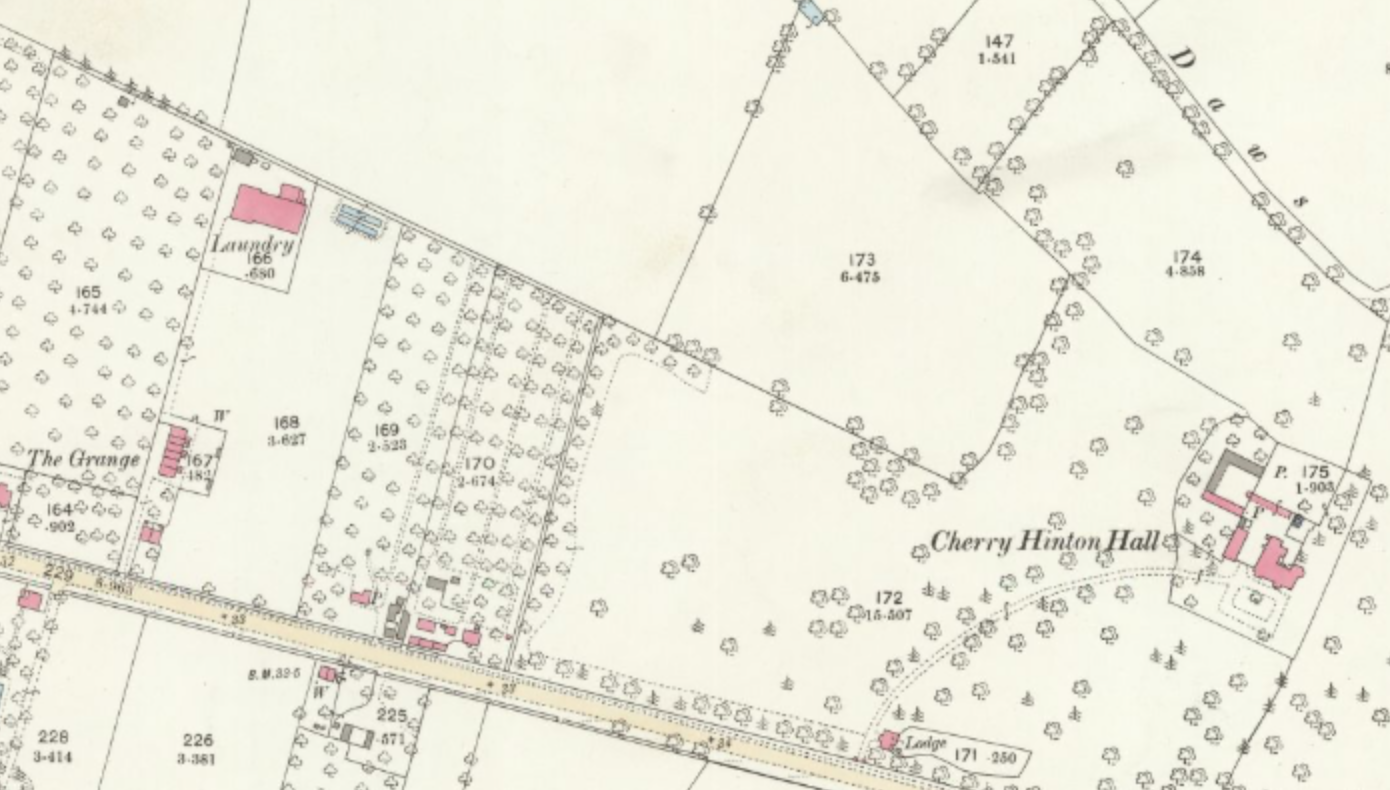
OS 25" 1888 (surveyed 1885) Showing the site of the newly established Cambridge Steam Laundry with its drying field and lane leading to the workers houses (left side of the picture above - Cherry Hinton Hall is shown to the right side of the picture above with Coe's Market Garden Farm (Lime Tree Farm) in the centre with its orchards.
In August 1882 a complaint was published in the Cambridge Newspaper (see below) about the contamination of water. This matter soon seems to be resolved and no further public reports are made. It does help us identify the water source being used for the works. The article refers to an open ditch which ran at the back of the Steam Laundry building and although not visible above ground there today. You will note on the map above that there are two long water-filled troughs which must have been made for use by the laundry.
1883
The laundry continued with consistent, regular advertising for business in the newspapers. You'll see from the advert below that the offices have now moved from No. 2 Alexandra Street to No. 5 and that the manageress of the laundry is Miss Daniel.
1885
By December 1885 the manageress is Mrs Pratt. The advert below also describes the laundry site a little more by mentioning the "Spacious well ventilated sorting, washing and ironing rooms and an extensive meadow for drying ground"
1887 By May 1887 we start to see the first of many sponsorship adverts between the Steam Laundry and Reckitts Blue. You can read more about Reckitts Blue at the 'Old and Interesting' website here: http://www.oldandinteresting.com/laundry-blue.aspx These sponsored adverts linked between the manageress of the Steam Laundry and Reckitts continue for many years and appear in adverts all over the country, providing a great deal of coverage and promotion for both parties. 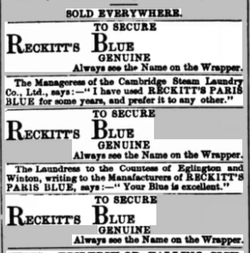 Richmond & Ripon Chronicle - Saturday 07 May 1887 - British Newspaper Archive. Richmond & Ripon Chronicle - Saturday 07 May 1887 - British Newspaper Archive.
1888 Kelly’s Directory:
Steam Laundry Co. Limited (Josiah Chater, sec.) 5 Alexandra Street; works, Cherry Hinton
1889
In 1889 we get the first look at the Cambridge Steam Laundry Company's logo in an advert placed in the Cambridge Independent Press. You'll also see that Mrs Pratt is still the manageress and Josiah Chater still the secretary.
1890
In the financial papers and financial sections of general newspapers continuing information about the share prices of the company are given regularly over the years.
In the 1890s there were newspaper adverts for more workers needed at the laundry, which provided employment for local people.
1891
The first full record of the people who worked and lived on-site at the new laundry is in 1891. The 1881 census was taken before the Steam Laundry was opened so there are no details for it for that year. The 1891 census shows 7 households living at the laundry site. James Pratt is listed as the manager along with his wife Annie Pratt who is the manageress. The remainder of the families appear to be housed due to the wives working at the company. On the OS Map (25" 1888-Surveyed 1886) you can see a terrace of 6 cottages down Laundry Lane and 2 separate semi-detached houses set back, facing Cambridge Road (Cherry Hinton Road) - it is not clear if these last 2 houses are part of the laundry houses. However, the 1901 Census lists two households (with the laundry manager & family living in one and the laundry Carman & family living in the other) as being on Cambridge Road and the rest are called Laundry Cottages Cambridge Road. It would make sense that the manager/s would have higher-grade houses, separate from the main workers.
1891 Census
Laundry – 1. James E Pratt Head M 35 Laundry Manager – Norfolk Old Catton Annie A Pratt wife M 31 Laundry Manageress – Loughton Essex Grace A Pratt daughter 6 Scholar – Cherry Hinton Daisy M Pratt daughter 4 – Cherry Hinton Fred Thomas Pratt son 10 months – Cherry Hinton Mary Ann Pratt mother widow 55 – Brook Norfolk Keziah Read servant single 14 Domestic Servant – Petersfield Hampshire Cambridge Road Laundry – (Cambridge Road is Cherry Hinton Road today) 2. John Osbourne Head M 67 Farm Labourer – Great Wilbraham Cambs Ann Osbourne wife M 64 Laundress – Little Wilbraham Cambs Annie McDonald Boarder 46 widow Laundress – Hanover Square St George London 3. Wilfred Freeman Head M 38 General Labourer – Royston Cambs Jane Freeman wife M 38 Laundress – Cherry Hinton John Henry Fuller step-son s 15 General Labourer – Cherry Hinton Sidney Fuller step-son 8 Scholar – Cherry Hinton 4. Isaac Read Head M 48 – Cherry Hinton - Buckworth Hants *Defective eyes* Elizabeth Read wife M 46 Laundress – Walworth Surrey Annie Read daughter s 18 Packer and Sorter in Laundry – Worcester Park Surrey Jessie Ann Read daughter s 16 Packer and Sorter in Laundry – Worcester Park Surrey Mary Elizabeth Read daughter 12 Scholar – Petersfield Hants May Read daughter 10 Scholar – Petersfield Hants 5. George Patten Head M 30 Carman – Cherry Hinton Jane Patten wife M 26 Laundress – Cherry Hinton Percy George Patten son 2 – Cherry Hinton 6. Arthur Nightingale Head M 34 General Labourer – St Andrew the Less Cambridge Sarah Anne Nightingale wife M 35 Laundress – Thriplow Cambs Julia L Nightingale daughter 6 Scholar – Cherry Hinton Arthur George Nightingale son 5 – Cherry Hinton Ernest H Nightingale son 2 – Cherry Hinton Emily Ann Benstead Servant s 12 Domestic Servant – Swaffham Prior Cambs 7. Margaret Daniels Head widow 53 Living on own means – Edinburgh Scotland *In 1891 the secretary of the Steam Laundry, Josiah Chater and his family - including Augustine Chater who would later take over the role from his father as secretary of the Steam Laundry - lived in Hartington Grove, off of Hills Road Cambridge*
1892 Kelly’s Directory
Steam Laundry Co. Lim. (Josiah Chater, sec.), 5 Alexandra st
In February 1892 the newspapers reported on the death of a well-known Cherry Hinton man, one of the Pamplin Brothers of the Steam Engine fame, who had a steam engine works in Cherry Hinton at the junction of Coldhams Lane and Cherry Hinton High Street.
Eliab Wright Pamplin died as a result of an accident, in which it was believed that he fell from the loft of his stable. The report notes that "Mr Pamplin was for some years Manager to the Cambridge Steam Laundry Company". We know that Mrs Pratt was still manageress in 1899, it is not clear when Mr Pamplin was manager but Mrs Pratt still continued to be manageress for some years.
1893
 Cambridge Independent Press - Friday 14 April 1893 - British Newspaper Archive. Cambridge Independent Press - Friday 14 April 1893 - British Newspaper Archive.
1894
There were many steam laundry businesses across the country by the 1890s and many books were written about the processes, equipment and running of these establishments. The newspaper article below discusses the wages of the Cambridge Steam Laundry Company as a comparison.
The continuing adverts both for the business and for employees gives us useful pieces of information that we can use to build a picture of the machinery used, the jobs available and the workings of the Steam Laundry. Click on each below to expand them.
1896 Kelly’s Directory
Cambridge Steam Laundry Co. Limited (J. Chater, sec.) Cherry Hinton, Camb Steam Laundry Co. Limited (Josiah Chater, sec.) 5 Alexandra St. Cambridge
The following newspaper article from December 1899, gives a report on proprietors and employees of Steam Laundries and is extremely useful as it includes the Cambridge Steam Laundry in the listings, giving a list of names of people working there. - you'll see the error in the print calling Cherry Hinton 'Cherry Linton'!
1901 Census
Cambridge Road – 1. James C Pratt Head M 45 Laundry Manager - worker – Norfolk Old Catton Annie A Pratt wife M 41 Laundry Manageress -worker – Loughton Essex Grace A Pratt daughter s 16 Pupil School – worker - Cherry Hinton Daisy M Pratt daughter 14 – Cherry Hinton – Typist Pupil – Own account at home Frederick T Pratt son– Cherry Hinton Annie A Pratt daughter 7 – Cherry Hinton Rose M Pratt daughter 7 – Cherry Hinton Mary A Pratt mother widow 68 – Brook Norfolk Margaret Daniel mother-in-law widow 63 – Scotland 2. Arthur H Wolfe Head M 32 – Laundry Carman – worker – Cambridge Alice Wolfe wife M 33 – Little Wilbraham Rose Wolfe daughter s 13 - Cambridge Harold Wolfe son 8 – Cambridge Laundry Cottages Cambridge Road Cherry Hinton – 3. Ann Osbourne Head Widow 73 – Little Wilbraham Cambs Agnes M W Maloney niece m 33 Laundress – worker – London 4. Henry J Frost Head M 37 – Steam Laundry – worker – Cambridge Jane Frost wife M 38 – Laundress – worker – Great Easton Essex Christopher W Frost son 12 – Cambridge Montague H Frost son 10 – Cherry Hinton William H Frost son 7 – Cherry Hinton Henry J Frost son 5 – Cherry Hinton Robert G Frost son 1 – Cherry Hinton 5. Arthur J Case Head M 28 – Asylum Attendent – worker - Cambridge Ann Case wife M 26 – Silverstone Northants 6. Frederick E Coe Head M 27 – Waterworks Stoker – worker – Cambridge Ellen Coe wife M 30 – Teversham Ellen E Coe daughter 6 months – Cherry Hinton 7. William Tingery Head 33 Foreman & Coal Porter – worker – Wheathampstead Herts Minnie Tingery wife M 32 – Cambridge Frances Tingery daughter 10 - Cambridge William E Tingery son 8 - Cambridge Dorothy Tingery daughter 1 – Cambridge 8. Arthur Nightingale Head M 44 – Brewers Labourer – worker - Cambridge Sarah A Nightingale wife M 45 – Laundry Worker – worker – Thriplow Cambs Julia L Nightingale daughter s 16 – Laundry Worker – worker – Cherry Hinton Arthur G Nightingale son 15 – Whitesmiths Assistant – worker – Cherry Hinton Ernest H Nightingale son 13 – Errand Boy – worker – Cherry Hinton William M Nightingale son 6 – Cherry Hinton 9. Frederick Bowles Head M 30 – Coal Carter – worker – Fulbourn Cambs Mary A Bowles wife M 28 – Whittlesford Cambs Frederick Bowles son 2 – Cherry Hinton Redvers Bowles son 6 months – Cherry Hinton Pretoria May Bowles daughter 6 months – Cherry Hinton *In 1901 the secretary of the Steam Laundry, Josiah Chater and his family - including Augustine Chater who would later take over the role from his father as secretary of the Steam Laundry - lived in Hartington Grove, off of Hills Road Cambridge*
Extensive regular advertising continues for the Steam Laundry in the local newspapers, again providing us with interesting clues and information about the business.
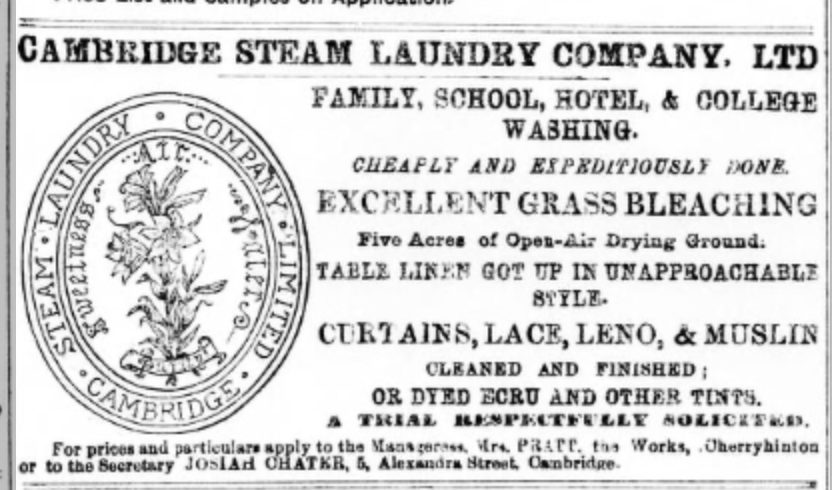 Cambridge Independent Press - Friday 08 November 1901 - British Newspaper Archives. Cambridge Independent Press - Friday 08 November 1901 - British Newspaper Archives.
1903
In 1903 the Cambridge Steam Laundry opened new Offices at 84 Regent Street Cambridge.
1904
With continued drainage of the land and management of the various streams crossing the fields to the west of the Steam Laundry, development continued across the western parish of Cherry Hinton, along Cherry Hinton Road towards Hills Road, which was known as 'New Cherry Hinton'. With the growing number of new houses, streets and shops, a new laundry called The Swiss Laundry, was built on the higher ground further to the west. The Swiss Laundry was founded in 1904 by Mr Chapman and Mr Goundry on the former site of a tannery. It offered a Swiss finish to table linen. This new laundry was to be in direct competition with the Cambridge Steam Laundry. It is worth further research to see what effect this event had on the Cambridge Steam Laundry share prices. As a result, the advertising campaign for the Cambridge Steam Laundry went into overdrive with many repeated and varied advertisements being placed in many local publications and newspapers. Some are shown below - click on each to open them fully.
1907
By 1907 Cambridge Steam Laundry had progressed from donkeys/horses and carts to including tricycles for their collections and deliveries.
In 1907 Cambridge Steam Laundry worker, 16-year-old Montague Frost, was involved in a serious cycling accident whilst riding a Steam Laundry carrier tricycle laden with linen.
1909
The advert below shows that things must have continued to go well for the Steam Laundry despite the competition further up the road, this was in part probably due to the sheer amount of new development leading to a decent number of customers going around. It's also worth noting that despite opening the new offices in Regent Street, the office at 5 Alexander Street was still in use.
In February 1909 drama unfolds with a robbery at the Steam Laundry premises. This is then reported in several newspapers across the country as well as locally.
Along with adverts seeking new staff the Steam Laundry continues with its regular advertising but is now able to include a phone number for the first time.
1911 Census - Cambridge Road now called Cherry Hinton Road
Mary Ann Oakman wife 23 – Laundry Hand Steam Laundry – worker - Cambridge Henry William Oakman son 6 – Scholar - Cambridge
Annie A Pratt wife 51 – “ “ “ “ – Laundry Manageress -worker – Loughton Essex Fredrick A Pratt son 20 s – Clerk Government Telegraph – worker – Cherry Hinton Annie A Pratt daughter 17 s – Cashier Café – Cherry Hinton Rose M Pratt daughter 17 s – Teacher (Pupil) School – Cherry Hinton Harrold G Daniel brother-in-law 45 s – Journalist – at home – Loughton Essex
Elizabeth Wolfe wife 38 M “ – Laundry Ironer Steam Laundry Company – Chesterton
Annie Coe wife 38 M – Dressmaking – own account, at home – Compton Devon Arthur Coe son 9 – School – Cherry Hinton Annie Coe daughter 6 – School – Cherry Hinton
Jane Frost wife 49 - “ “ “ - Essex Christopher Frost son 21 s – Labourer to Carter – Cherry Hinton Montague Frost son 20 s – Labourer to Carter – Cherry Hinton William Frost son 18 s – Farm Labourer on Land – Cherry Hinton Harry Frost son 16 s – Farm Labourere on Land – Cherry Hinton Robert Frost son 11 s – School – Cherry Hinton Sidney Frost son 8 s – School – Cherry Hinton
Emily Patten wife 28 M – Trumpington Rose Patten daughter 7 – School – Cherry Hinton Frederick Patten son 4 – Cherry Hinton Sidney Patten son 4 – Cherry Hinton Maude Patten daughter – 3 months – Cherry Hinton
Emily King 30 M – Laundry Maid Steam Laundry – worker – Arlesey Beds
Olive Harriet Miller wife 47 M “ “ “ “ – Forewoman Laundry – worker – St Pancras Islington William Frederick George Miller son 11 – School – Wood Green Middlesex Robert Rick Miller son 8 – School – Wood Green Middlesex
Sarah Ann Nightingale wife 55 M – “ “ “ “ – Laundry Ironer – worker – Thriplow Julia Louise Nightingale daughter 26 s – Laundry Ironer – worker – Cherry Hinton Arthur George Nightingale son 25 s – Whitesmith – worker – Cherry Hinton Ernest Henry Nightingale son 22 s – Wheelwright – worker – Cherry Hinton William Mark Nightingale son 16 s – Under Gardener – worker – Cherry Hinton
Mary Ann Bowles wife 38 M “ “ “ “ – Whittlesford Cambs Dorothy Bowles daughter 13 – School – Cherry Hinton Frederick George Bowles son 12 – Cherry Hinton Redvers Bowles son 10 – Cherry Hinton Pretoria May Bowles daughter 10 – Cherry Hinton *In 1908 Josiah Chater died, the role of secretary to the Steam Laundry Company most likely fell to his son Augustine Chater at this date. In 1911 Augustine was living in Hartington Grove, off of Hills Road Cambridge*
1912
In 1912 we find the first mention of the use of motorised vehicles for the Steam Laundry.
1916
By May 1916 the effects of the First World War on businesses were being felt and a claim was placed by the Steam Laundry to hold on to their key worker, William Henry Wenham, rather than him go off to war, stating that if he were to go, they would probably have to shut down. We can see from the newspaper report below that the Steam Laundry was engaged in army work by the washing of army blankets.
1918
Throughout 1917-1918 the Steam Laundry places less of its regular weekly newspaper adverts for business and instead, there is a constant stream of weekly adverts places requesting staff for various jobs. The advert below, for example, states that a war bonus is included.
In July 1918 we can see that William Henry Wenham was granted another 3 months' extension to continue working at the Steam Laundry rather than be sent of fighting. This must continually be requested.
1923
For a few years after the war there were quite a lot of newspaper adverts placed for job vacancies at the Steam Laundry but no real regular adverts for business like there had been before the war. In 1923 we find the following newspaper notice which discussed one of the Steam Laundry cottages. We can see that the office at 5 Alexandra Street was still in use and that the manageress was now Annie Wheeler.
1925
In January 1925 Mr Rutter dies and the newspaper obituary states that he was a director of the Cambridge Steam Company.
1933
In 1933 another break-in at the Steam Laundry occurred with an interesting tale of how the culprit was caught!
The full tale unfolds in March 1933 in the trial report given in the newspaper, which you can read below - click on each picture in turn to see the full details!
In the report we discover that Edna Fisher, who gives evidence in the trial, is Chief Clerk of the Steam Laundry. Saffron Walden Weekly News - Friday 10 March 1933 - British Newspaper Archive.
In the end, at sentencing, Thomas Spriggs was found not guilty.
1935-36 Cambridgeshire County Directory
Cambridge Steam Laundry Co. Ltd. Receiving office 4738 Works 87548 Chater, A. B. A.C.A., F.C.I.S., secretary Cambridge Steam Laundry, Cherry Hinton road and 54 Regent Street *Augustine Barrett Chater was Josiah Chater's son*
1937
The following newspaper notice shows that the laundries are working together - how this worked in practice and affected the public ownership of the Cambridge Steam Laundry is not clear and would merit further research.
In 1937 we find the first general business advert in many years for the Steam Laundry. It is much plainer than those that they used to publish before the war, and you'll note that there is now a new phone number for the Steam Laundry.
1938 The Blue Book Cambridge Directory
Cambridge Steam Laundry Co., Ltd. Cherry Hinton meadows. 87548 Cambridge Steam Laundry Co., Ltd. (Chater, A. B.), 54 Regent st. 4738
By 1938 Kelvin Close was laid out to the immediate west of the Steam Laundry and the houses were built just before the war.
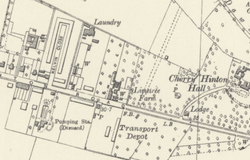 OS 6" surveyed 1935 published 1945. OS 6" surveyed 1935 published 1945.
1939
A very sad tale appeared in the newspaper in August 1939 which tells of the suicide of Francis Cort Carpenter, Manager of Cambridge Steam Laundry. You can click on each of the pictures below to read more.
With the outbreak of World War Two the Steam Laundry business was once again affected.
1946
I visited the Cambridgeshire Archives at Ely to look at the records that they hold for the Steam Laundry at Laundry Lane. They hold a set of building bylaw plans which I was able to photograph. Cambridgeshire Archives Reference: KCB/2/SE/3/9/14843 Building byelaw plan and approval for alterations and additions to laundry, Cherry Hinton Road (Cambridge Steam Laundry) 11th Feb 1946.
Cambridgeshire Archives: KCB/2/SE/3/9/14843 Building byelaw plan and approval for alterations and additions to laundry, Cherry Hinton Road (Cambridge Steam Laundry) 11th Feb 1946.
I sent Penny the plan which showed the houses on the Steam Laundry site, and she kindly highlighted in yellow, which house used to be theirs - see below:
"I was pleased to see that the well was marked on the plan, it was practically in our back garden! It's a shame that the Lane is in such a mess now.....On the attached plan that you kindly submitted I have highlighted our cottage and we resided there circa 1952-1962."
1948
1962
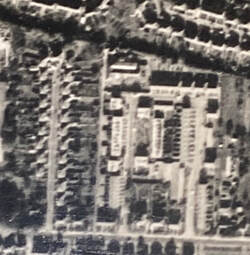 c.1962 Aerial view showing the newly built Derwent Close over the drying meadow with the Steam Laundry still reachable at the rear, via Laundry Lane - Fairley Surveys c.1962 Aerial view showing the newly built Derwent Close over the drying meadow with the Steam Laundry still reachable at the rear, via Laundry Lane - Fairley Surveys
1954
From around 1950 the Cambridge Steam Laundry had begun a new service of Dry Cleaning and had begun its advertising campaign by 1954 Perhaps this was in part because it had now lost its traditional drying ground to the new houses. For several months there were many newspaper adverts placed to call for new employees at the Steam Laundry, in the 'Dry Cleaning Department'. Mrs B Jackson & Co. 3 Regent Street, was one of the first businesses in Cambridge offering Dry Cleaning from 1900 onwards. The Swiss Laundry had also offered dry cleaning since its opening in the early 1900's.
1962 In 1962, during the last years of the laundry, Mr H Dorcey of Cambridge Steam Laundry represented on the East Anglian Council section of the Institute of British Launderers. 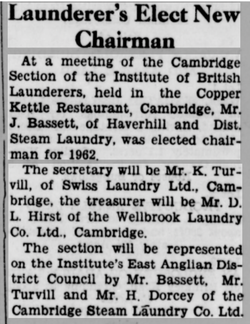 Haverhill Echo - Saturday 24 February 1962 - British Newspaper Archive. Haverhill Echo - Saturday 24 February 1962 - British Newspaper Archive.
In the same month of February 1962 Cambridge Steam Laundry changed its name and became the Cambridge Laundry and Cleaners Ltd with Mr Dorcey identified as the general manager. The company then takes over another laundry - The Coldham Model Laundry - bringing along a few of its staff.
1969
In August of 1969, the end of the 88-year history of Cambridge Steam Laundry was coming to an end. The name had been changed in recent years, but the business did not last much longer. The remaining premises and land were listed for sale by direction of Lyndale Laundries Ltd.
By October 1969 the public auction sale of the site had been withdrawn, citing the reason that the site had been sold by private treaty.
The mystery surrounding this sale was noted in a newspaper article the following year. It seems that after the private sale of the land in October 1969, the business had carried on for almost another year under its name of Cambridge Laundry and Cleaners Ltd, which had been owned by Mr W Shaw. It soon becomes apparent that the Swiss Laundry had taken over the Cambridge Laundry business. The Cambridge Steam Laundry, albeit with a new name change, finally closed for good on the site it had occupied for 89 years.
Today the Cambridge Steam Laundry Buildings are all gone and in their place is a new housing development called Brothers Place. Laundry Lane remains as a rough road now leading to a dead end.
You can download a PDF copy of Michelle's History of Cambridge Steam Laundry Company and Penny & Nicks article for free, by clicking on the buttons below.
Please do feel free to get in touch if you would like to add anything to this story or if you have any further information on the Cambridge Steam Laundry.
If you'd like to support the work that I do and the archive, why not buy me a virtual coffee or make a one-off donation at PayPal, I'd be really grateful and it will help keep me going! Just click on either of the buttons below :)
Suggested further reading and research:
Books that are worth reading on the subject: The Steam Laundry and its Methods - Charles A Royce How to Successfully Operate a Steam Laundry - Caleb David Patterson (Classic Reprint) The Steam Laundry. Its Construction, Equipment and Management - Taylor, John. (Consulting Laundry Engineer) LAUNDRY MANAGEMENT. A Handbook For Use In Private And Public Laundries - Editor of "The Laundry Journal" A Manual Of Modern Steam Laundry Work 1912 - Ellis Clayton Steam Laundries: Gender, Technology, and Work in the United States and Great Britain, 1880-1940 - By Arwen P.Mohun (Baltimore, Johns Hopkins University Press, 1999) Further Suggested Archives and Records to Consult: Cambridge University Library: Laundry books, 1956 - 1968 Reference Code: GBR/0265/UA/BG 18 Scope and Contents Record laundry taken in and money paid. Several of the books in this series were used concurrently. Dates: 1956 - 1968 Conditions Governing Access: From the Fonds: Among the archives of the Botanic Garden, personal records are closed to scholars for 80 years from the date of creation under data protection legislation. Restrictions are clearly indicated in catalogue entries. Found in: Cambridge University Library / GBR/0265/UA, Cambridge University Archives / Teaching, learning and research records / Archives of the Botanic Garden Personal diaries: Volume 39 (loose inserts), 1930 Reference Code: GBR/0271/GCPP Tillyard 1/1/39a Scope and Contents Photograph of AT with ? Agatha at St Anthony-in-Roseland in Cornwall; also press cutting re a carol concert given by the Perse School at the Cambridge Steam Laundry works. Dates: 1930 Found in: Girton College Archive / GBR/0271/GCPP, Personal Papers / Personal Papers of Aelfrida Tillyard / Personal and biographical records / Personal diaries, 1897-1959, together with documents formerly contained loose in the diaries, 1868-1959. Personal diaries: Volume 50, 1935-11-01 - 1936-06-08 Reference Code: GBR/0271/GCPP Tillyard 1/1/50 Scope and Contents Oxford. Still at St Benedict's. Alethea also living in Oxford - frequent visits. Brief visit to Cambridge - resigns directorship of the Cambridge Steam Laundry. Continued illness: goes to a nursing home in Torquay in Jan. 1936. March 1936 - has an operation then convalesces at the Convent of the Holy Trinity. Otherwise this volume contains largely description of the contemplative and religious life - occasional comment on the world, eg the situation in Germany. Discussions with Father Cary,... Dates: 1935-11-01 - 1936-06-08 Found in: Girton College Archive / GBR/0271/GCPP, Personal Papers / Personal Papers of Aelfrida Tillyard / Personal and biographical records / Personal diaries, 1897-1959, together with documents formerly contained loose in the diaries, 1868-1959. + taking on her father's role as a director of the Cambridge Steam Laundry Ltd. Writing: 'Concrete' and 'Can I be a Mystic?' both published by Tillyard, Aelfrida Cambridgeshire Collection: The laundry of perfection Author: Cambridge Steam Laundry Co. Ltd Imprint: n.d. Collation: 4 p. ; 19 cm. Dewey class: C.27.2 Local class: C.27.2 Language: English Subject: Cambridge Steam Laundry Co. Ltd BRN: 1144480 Cambridge steam laundry, 80 Regent St and adjoining shops Imprint: 1907-1911 (circa) Notes: Indexes: Yes Dewey class: P.Stea.K0 B.REG.K0 PC.Lan.K0 Local class: B.REG.K0 Language: English BRN: 1024081 The Cambridge Steam Laundry, Cherry Hinton Road, Cambridge Author: Sales Catalogue Imprint: Cambridge, 1969 Collation: p.7 ; 35 cm. Notes: With map enclosed Dewey class: C.06 CABINET Language: English Subject: Cherry Hinton Road
0 Comments
I came to Cambridge at the outbreak of the Second World War in September 1939 as a six-year-old boy, from New North Road, London, with my junior school from Islington. We walked around Cherry Hinton looking for people to take children into their houses. I ended up at a large house next to the Rosemary pub on Coldham’s Lane. My school was in Cherry Hinton at the green tin hut near the railway crossing. After a while, my lessons were moved into the school classroom from the hut. My playground places were the Spinney in Cherry Hinton and the chalk pits at Coldham’s Lane. One night during an air raid a high explosive, bomb hit Riche’s scrap yard killing the guard dog at the nearby cement works. I was standing in the road at the time when a bomb hit the cement works but didn’t explode. On another occasion, I was on Coldham’s Lane by the Rosemary pub when a German Dornier flew low over me on its way over Marshall’s airport. When America entered the war, many Americans came to Cambridge. They always had sweets to give to us children and the cement works road in Coldham’s Lane had conveys of trucks getting cement for their airfield runways. As the convoys were going into the cement works, I climbed in alongside the driver at the beginning of the cement works road, travelling with them whilst they collected the cement, and when the vehicle got back to Coldham’s Lane I got out. I always asked, “Have you got any gum chum?” They always had! When I was about nine years old, I joined the choir of Great St Mary’s Church in Cambridge, walking there and back for morning and evening services. One end of Marshall’s airfield was near to a field in Rosemary Lane. On a few occasions, my friend and I crawled through the barbed wire fencing to go up to the bombers to have a close look at them. After a few times of this, we were chased off by one of the guards, but it was good fun at the time. I spent a lot of days at Coldham’s swimming pool where I learned to swim. Coldham’s Common was covered in stone pillars to prevent German gliders or aircraft from landing. At the end of the war, I was eleven years old, and the children that I knew went back to London. When I saw my father and asked him about me going home, I was told he had no place to take me to. I then had to go to Cherry Hinton Children’s Home in Cherry Hinton Hall, with other evacuees and I attended Coleridge School. Cherry Hinton Hall was a grand old building with a stream running underneath the building and into the lake on the grounds of the Hall. It was a good place for boys as there were plenty of trees to climb and conkers to collect. There were five other boys of various ages, and I was the oldest. It was run by Miss Johnson. She was a very good lady at running the boy’s home. She treated us as her own. It had a bad reputation owing to older streetwise boys living in the hall and the headmaster of the secondary school would come to help Miss Johnson. On Coldham’s Lane, where the sweet shop used to be opposite Queen’s Meadow, I was with a young lad who had gone into the shop to get some sweets. An older, big boy, known to be a bully came over and hit my friend for no reason at all, and made him cry. I was having none of this, so I turned round and hit him on the chin knocking one of his teeth out. Being a typical bully, he ran home crying. He got his brothers to come after me on their way to school but I used to go around other ways to avoid them and they had to make sure they were not late for school, so they never got me. The village boys didn’t realise how streetwise we London boys were. Next to the Hall was an Italian prisoner-of-war camp, on Walpole Road. I spent a lot of time in their camp talking to them as some could speak a little English and they made toys for us. After about two years of being at Cherry Hinton Hall, we were told it was going to close as a children’s home and the boys were told we would be going to the Red House children’s home at Little Shelford. This was a sad day for the boys who had nowhere else to live. On the day we left Cherry Hinton, I, being the eldest, took the boys to the pictures in Cambridge. Then we had to catch the bus to Shelford and then to the children’s home. It was a large house with many rooms and a very large garden with a brook running down one side. The bad reputation of the boys from Cherry Hinton Hall during the war had reached the children’s home in Shelford. One day, when my friend David and I were talking to two of the village girls who were on the other side of the stream, a man called out to them. “You don’t want to talk to them. They go round with a ball and chain on their feet”. So, the bad reputation of Cherry Hinton Hall during wartime had preceded us. But we changed their minds when they got to know us. I even played football for Shelford. Having moved to Shelford I still went to Coleridge School, until I left at the age of fifteen. The council then found me lodgings in Cambridge. I was then working as a printer in Cambridge. The third lodgings the council found me turned out to be two doors away from my future wife Doreen. She was fourteen at the time and I was sixteen. We were together for seventy-two years, until her death in January 2022. When I was eighteen, I was called up for the army. After several weeks of intense training, I became a paratrooper and joined Two Para serving in Egypt, Cyprus, and Transjordan. When I left the army, I went back to my job as a printer. Doreen and I got married, I was twenty-two and she was twenty. We had three children, all boys. Two were twins and an older brother by three years. I later joined the Royal British Legion at Waterbeach and, after a few years of training, became their Standard bearer. I entered competitions and became the county Standard bearer a position I held for a number of years. It was when my wife and I went to a function on The Green at Waterbeach that I noticed there were several ex-paras there with a stall selling various items including military badges and other items of interest. They asked me if I would join the Cambridge branch of the Para Association, which I did. It was a very active branch which organized trips to Arnhem every other year. I eventually carried the branch Standard to the events at Arnhem and other places in the U.K. At the age of seventy-two, I became the Para Association National Standard bearer. The Standard is the only Standard of the Para Association that has a Union Jack in the top corner. About a year later the Standard was being ‘laid up’ and I was to receive the honour of carrying the new one, at the event where it was to be dedicated at a church in Normandy. At one of the Normandy events, a bust of Major Jack Watson was to be unveiled by Prince Charles (as he was before becoming King). I asked him if he was doing the unveiling as I had the National Standard with me. He told me to bring it over and when telling my superiors of this they replied that they couldn’t overrule his wishes. In my seventeen years as the National Standard bearer, I carried the Standard every year to the Ardens, Rhine Crossing, Belgium, Normandy, and Arnhem. I would like to pay a special tribute to my wife Doreen who accompanied me on all my duties, at home and abroad. Without her support, I am sure I would not have carried on for as long as I did. I would also like to thank the Watson family, the Zannette family whose father was a Normandy veteran, Ralph, who organised all the trips, and Barry our bugler of many years. Jane and Elaine Zannette are still very much in contact with me. I go to Kent to stay with them for a few days and they come up to stay with me. They also ring me to make sure I am okay. Ken Price 2023 Many thanks to Patricia Curry for helping Ken write up his memories. You can download a PDF copy of the original article by clicking on the button below.
|
Cherry Hinton History Pages:
Contents If you'd like to go straight to a specific article or blog post within the Cherry Hinton History Page you can click on any of the post titles in the list below and it will take you directly there. Alternatively, you can use the search box above to search by keyword or you can use the index further below. About & how to use:This is the blog page for my articles, memories and archives relating to the archaeology and local history of Cherry Hinton, a village to the southeast of Cambridge UK. The area covered is the old Parish of Cherry Hinton which today includes the Ward of Queen Edith's. The Categories below are really the keyword index of what is on the Cherry Hinton History Pages. Each is a clickable link which will take you to an article or blog which contains that word or subject.
Categories
All
Archives
May 2024
|
||||||||||||||||||
